As part of its continued efforts to promote sustainable livelihoods and strengthen community-based conservation, the Royal Society for Protection of Nature (RSPN), in collaboration with the College of Natural Resources (CNR), conducted a week-long Training on Rural Entrepreneurship from July 9th to 15th, 2025 at CNR, Punakha District.
The training was designed to build the capacity of local officials to foster rural-based entrepreneurship in sectors such as beekeeping, fisheries, ecotourism, and high-value vegetable and crop cultivation. These efforts are aligned with RSPN’s broader goal of reinforcing the conservation of the critically endangered White-bellied Heron (WBH) through inclusive community engagement and sustainable economic development.
A total of 28 participants from the WBH landscape, including Dzongkhag Agriculture and Livestock Officers, Economic Development and Marketing Officers, Gups, and Gewog Administrative Officers, took part in the training. Their diverse expertise and local knowledge contributed to enriching the dialogue and ensuring the contextual relevance of the training. The key objectives and highlights of the training are:
As a result,participants gained a deeper understanding of rural entrepreneurship and developed practical skills necessary to initiate and sustain small-scale enterprises aligned with both community needs and conservation goals.This initiative marks an important step in promoting people-centered conservation, where local livelihoods and biodiversity protection go hand-in-hand.Through the empowerment of local changemakers, RSPN endeavors to position rural communities as key actors in environmental stewardship and contributors to Bhutan’s sustainable economic development.
“This training is more than just about business it’s about building resilient rural communities that take pride in conserving their natural heritage,” shared one of the participants.
This activity is part of the IKI Project, “Developing Ecosystem-based Solutions for Managing Biodiversity Landscapes in Bhutan,” funded by the BMUV and co-funded by the MAVA Foundation and RSPN.
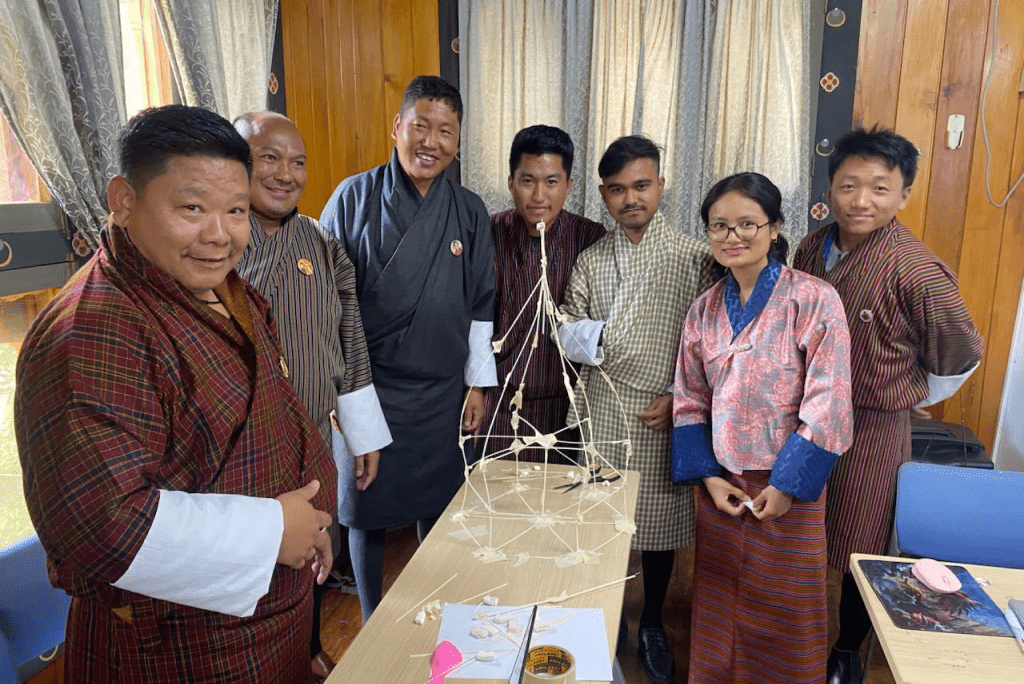
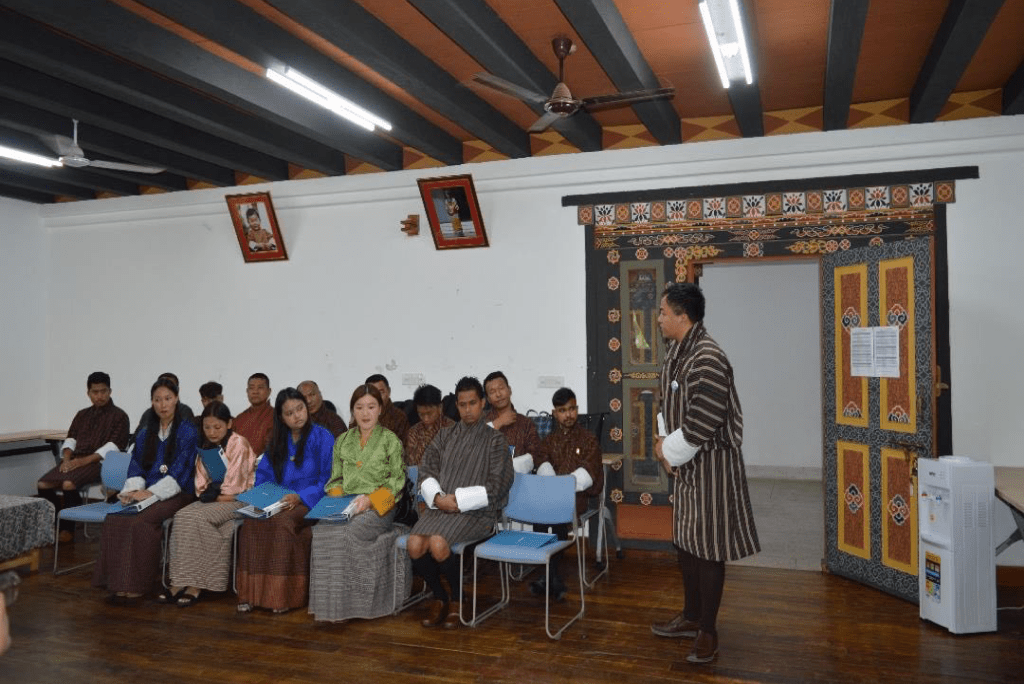
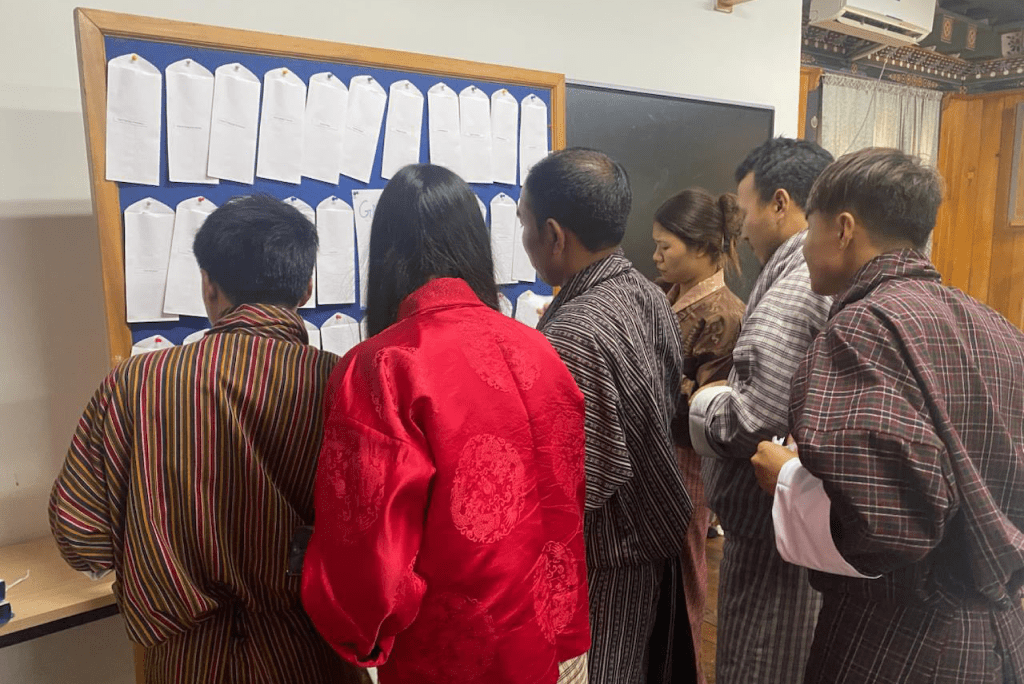
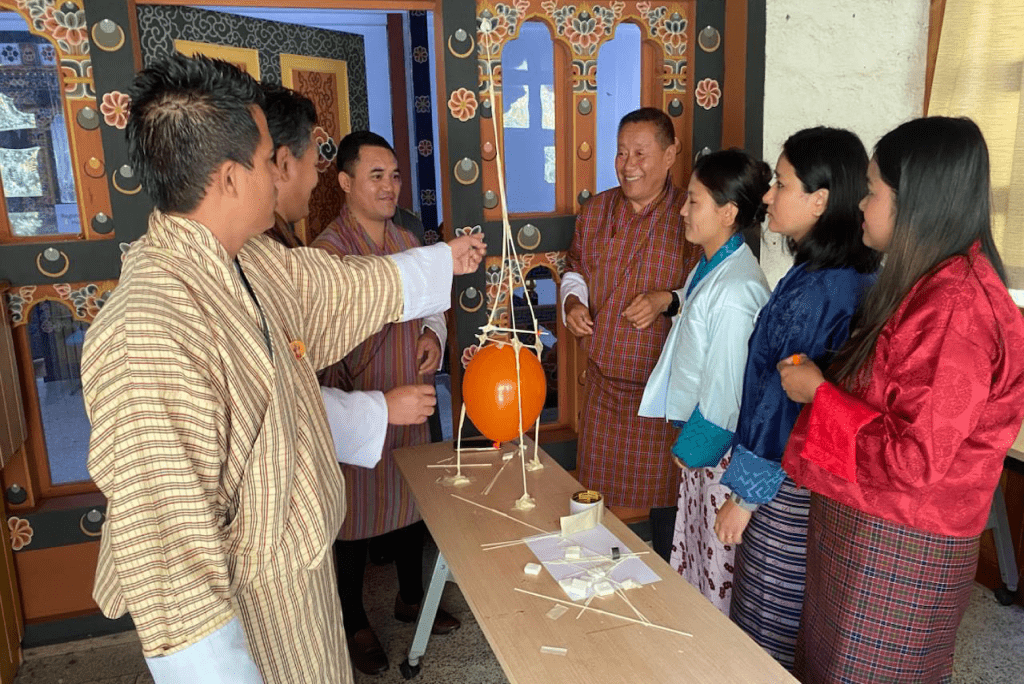
RSPN Bhutan hosted a two-day’s consultation meeting focused on creating sustainable livestock initiatives along the Mangdechhu and Punatshangchhu basins, which are crucial habitats for the Critically Endangered White-bellied Heron (WBH).
The meeting gathered key implementing partners from various government agencies ; Department of Livestock, National Livestock Research Centre (NLRC), Dzongkhag Livestock Officers, and Agriculture Officers from the six project districts.
The meeting focused on creating sustainable, integrated livestock initiatives like beekeeping and fishery that will both support local communities and strengthen conservation efforts for the WBH.
We extend our gratitude to all the participants for your valuable inputs.
This activity is part of the IKI Project, “Developing Ecosystem-based Solutions for Managing Biodiversity Landscapes in Bhutan,” funded by the BMUV and co-funded by the MAVA Foundation and RSPN.
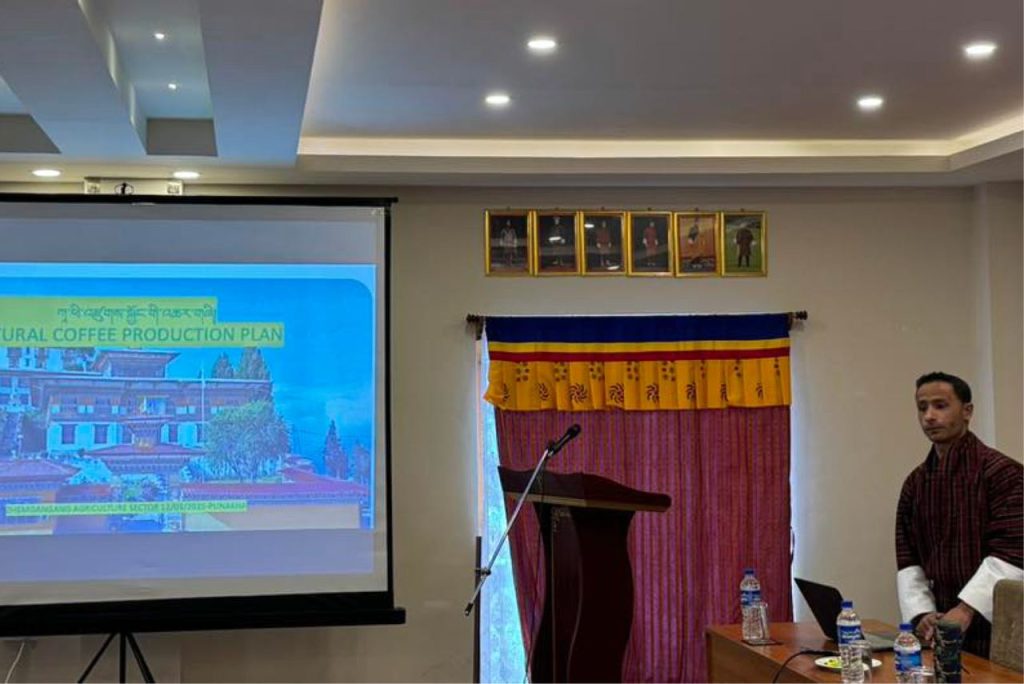
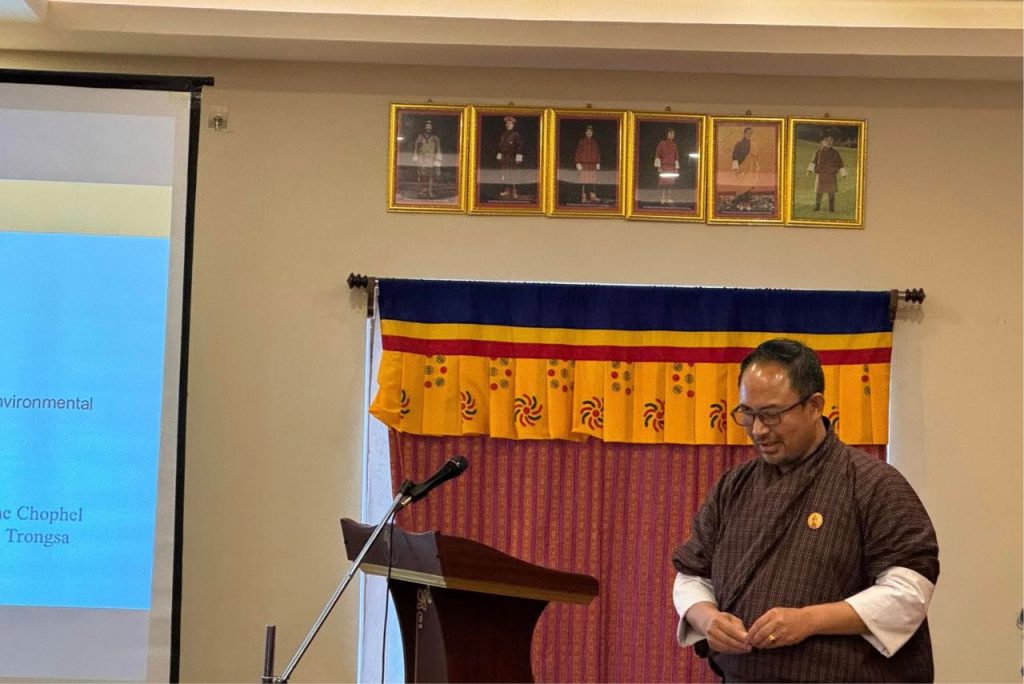
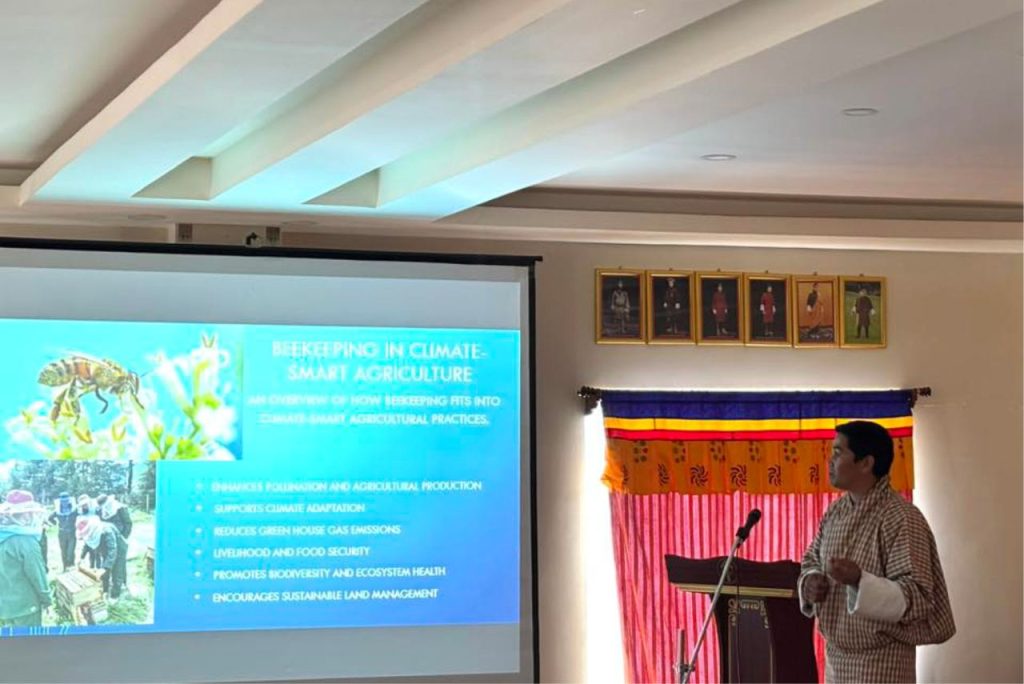
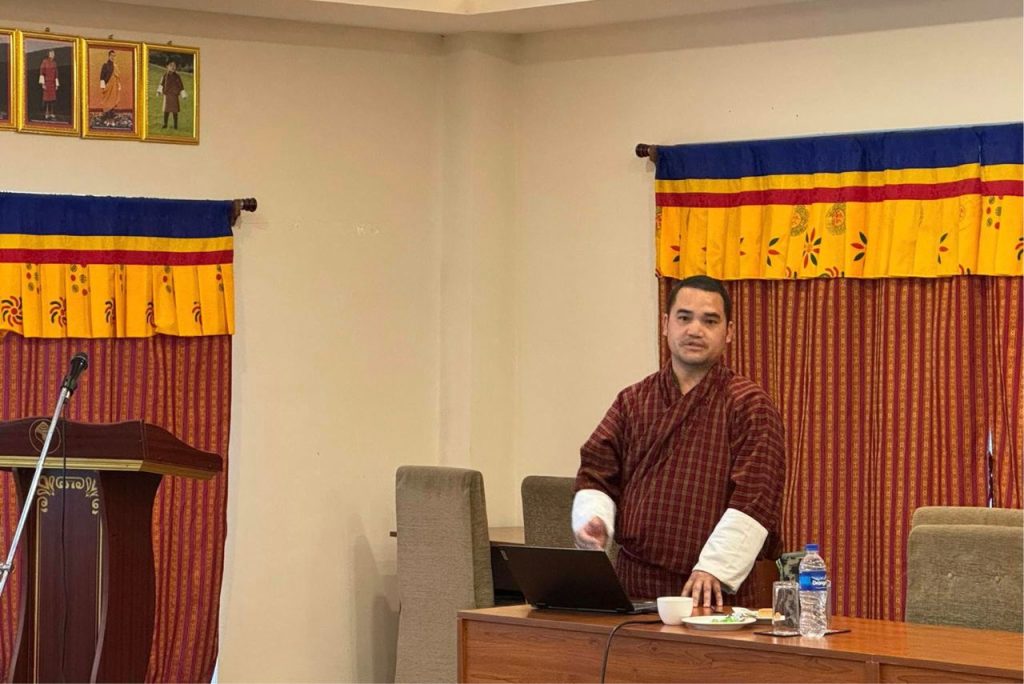
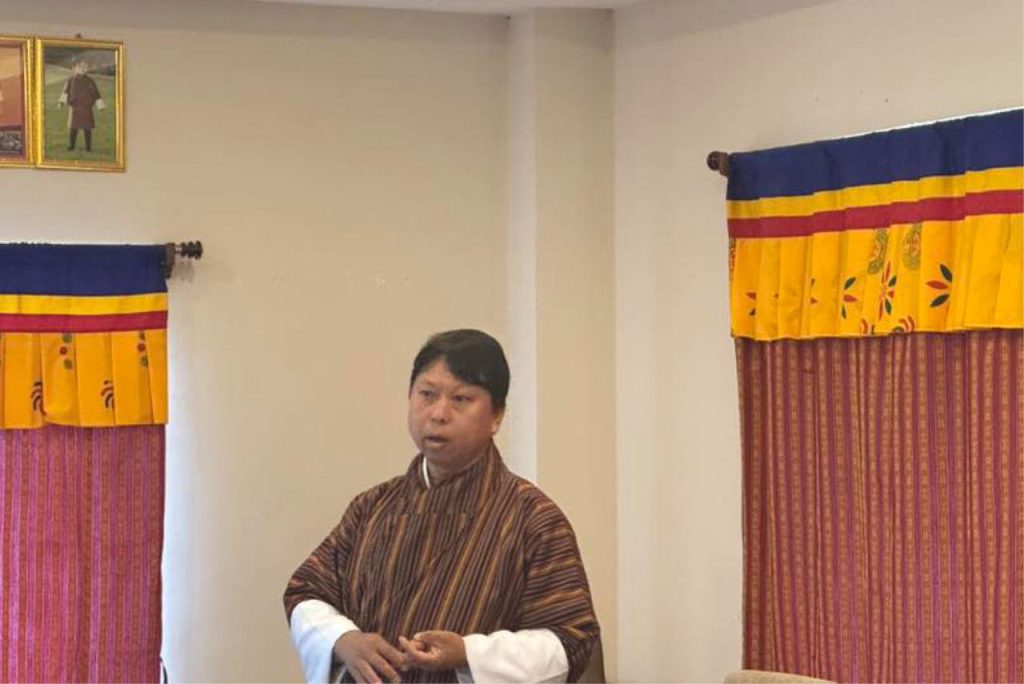
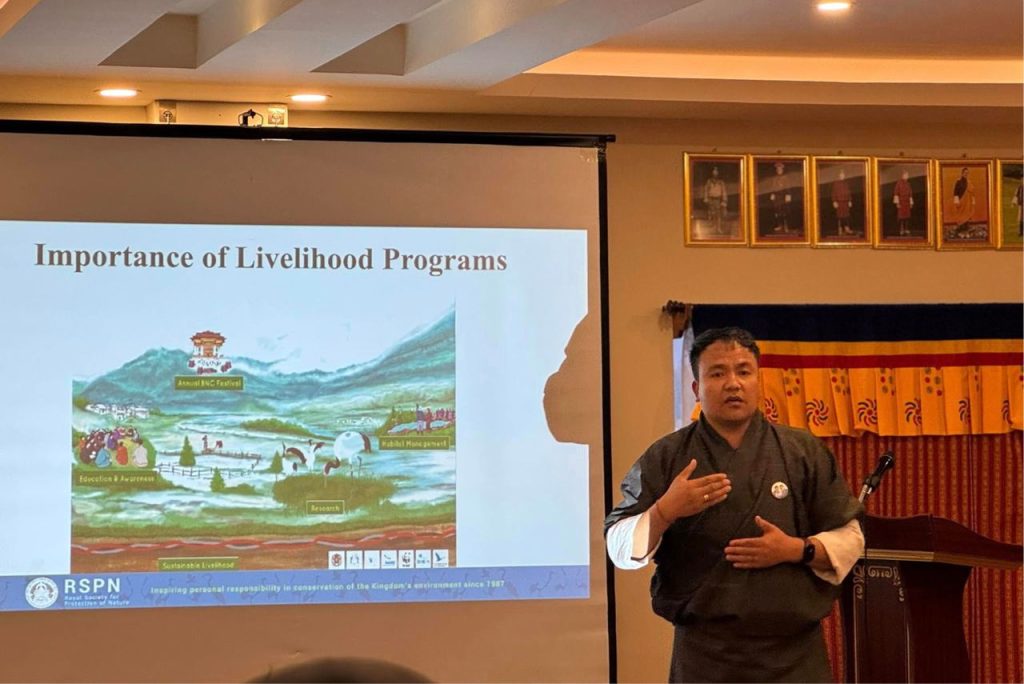
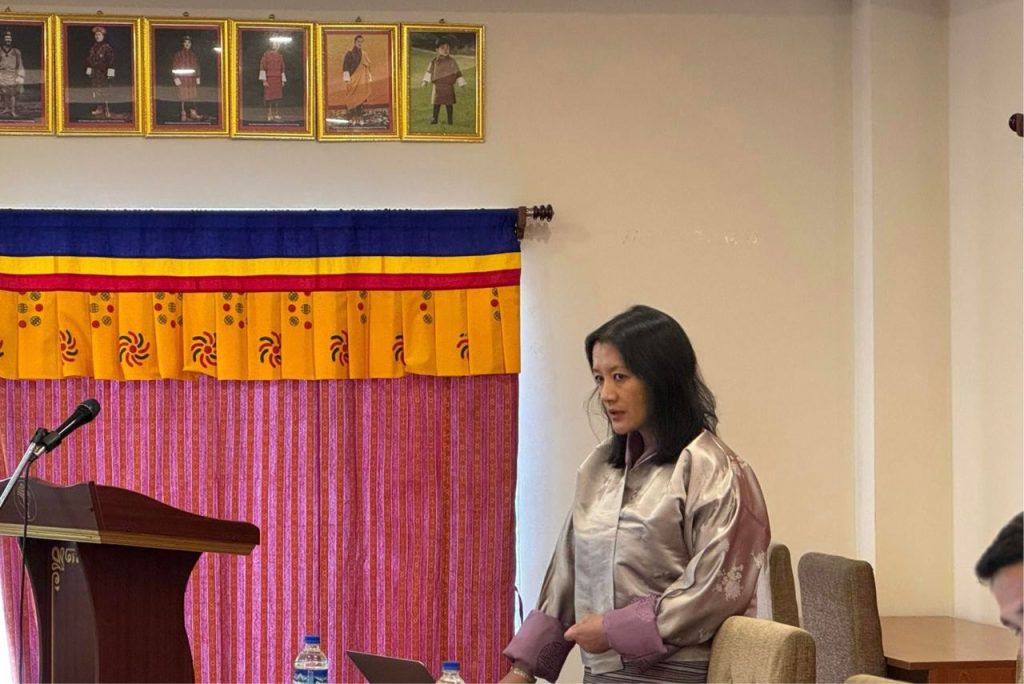
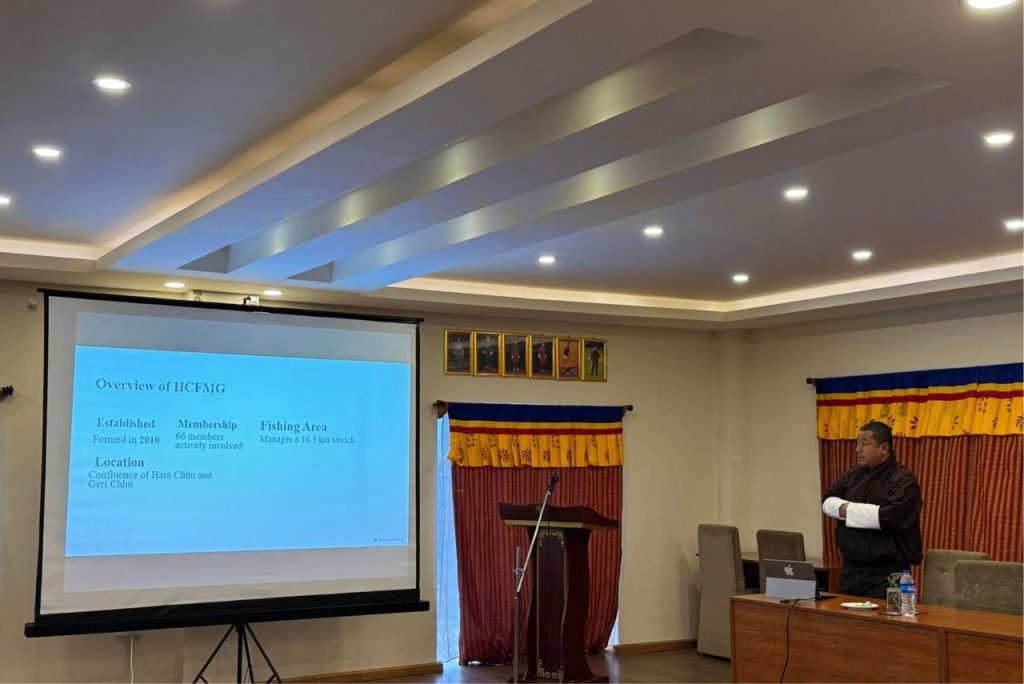
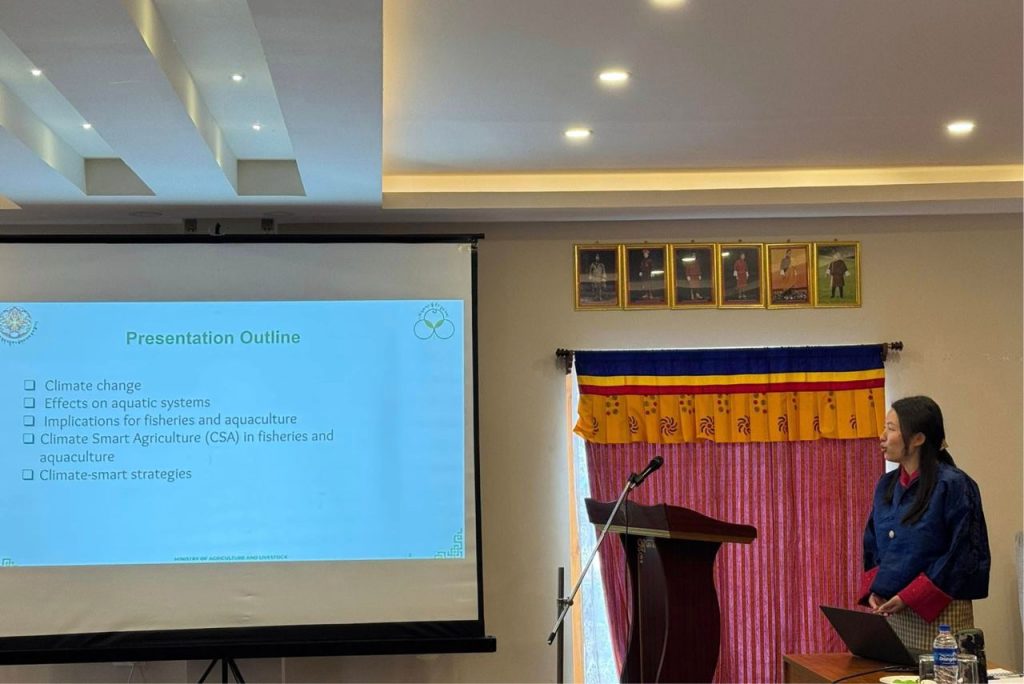
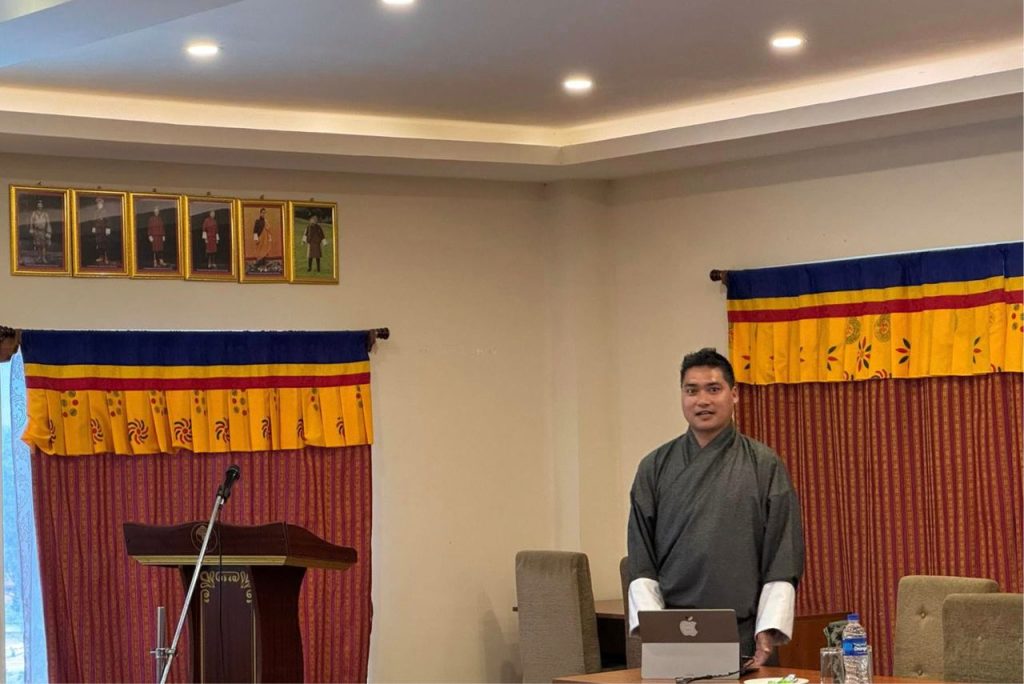
The consultation meeting organized by RSPN Bhutan aimed to discuss the development of community seed banks along the Mangdechhu and Punatshangchhu basins, one of the key habitats of the Critically endangered #Whitebelliedheron.
The meeting brought together representatives from various government bodies; Department of Agriculture, Royal Government of Bhutan, Department of Livestock, Royal Government of Bhutan, National Seed Centre, National Biodiversity Centre Bhutan, ARDC, and Dzongkhag Agriculture Officers from six project districts (Dagana, Punakha, Trongsa, Zhemgang, Tsirang and Wangduephodrang).
The meeting’s objective was to share ideas and foster collaboration to ensure the sustainability of community seed banks initiatives ultimately supporting the conservation and use of native/ traditional species and high yielding varieties.
This initiative is part of the IKI Project, “Developing Ecosystem-based Solutions for Managing Biodiversity Landscapes in Bhutan,” funded by the Federal Ministry for the Environment, Nature Conservation, Nuclear Safety and Consumer Protection (BMUV) through the International Climate Initiative (IKI), with co-funding from the MAVA Foundation, Switzerland, and the Royal Society for Protection of Nature (RSPN).
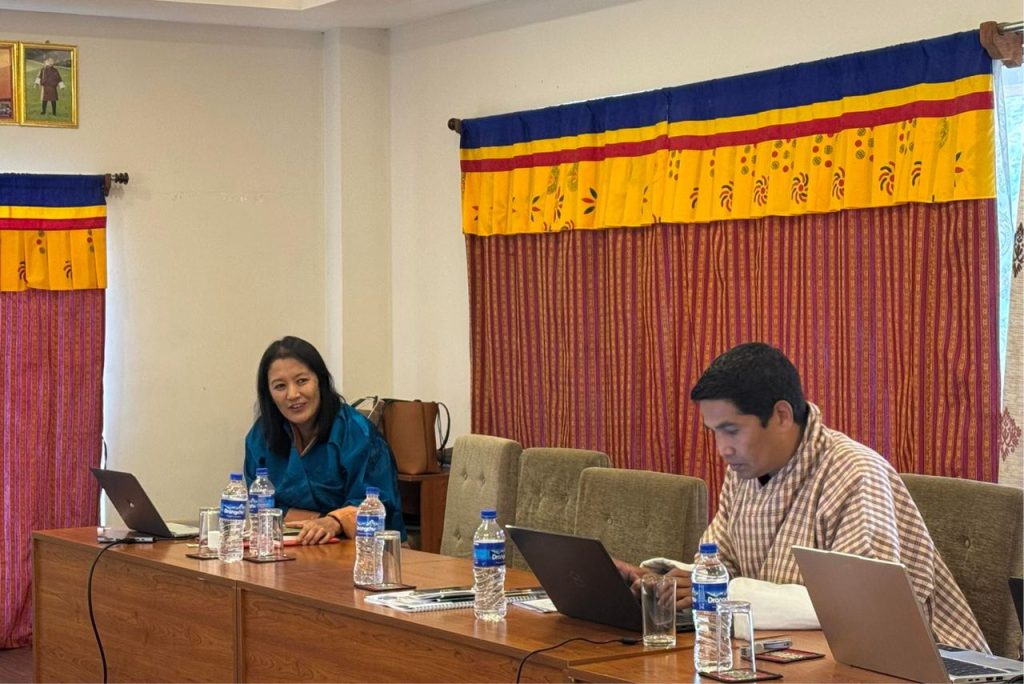
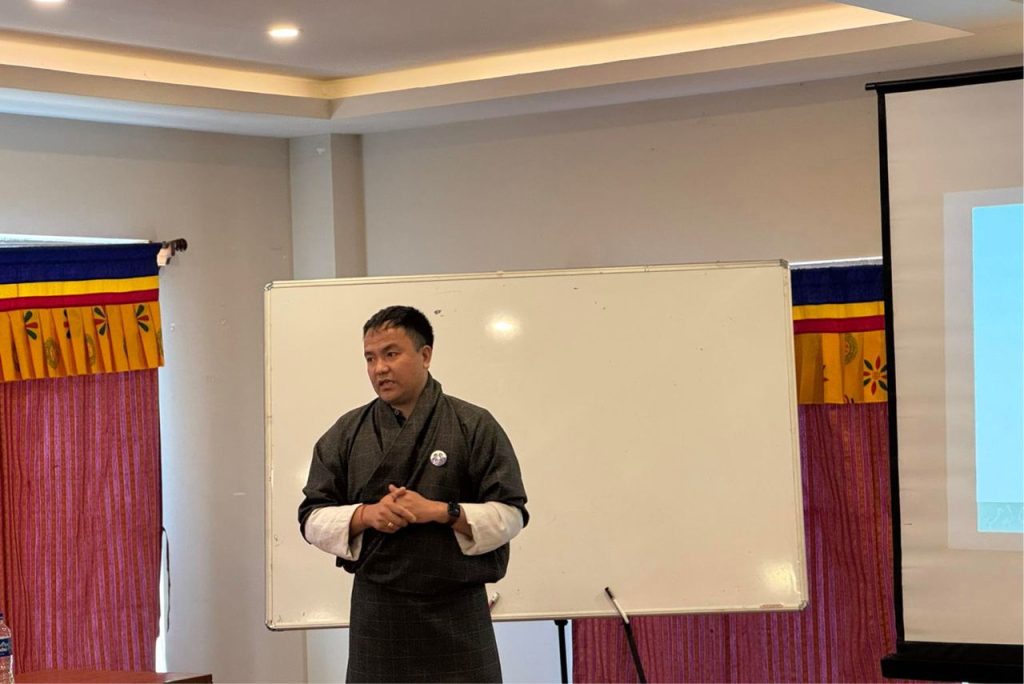
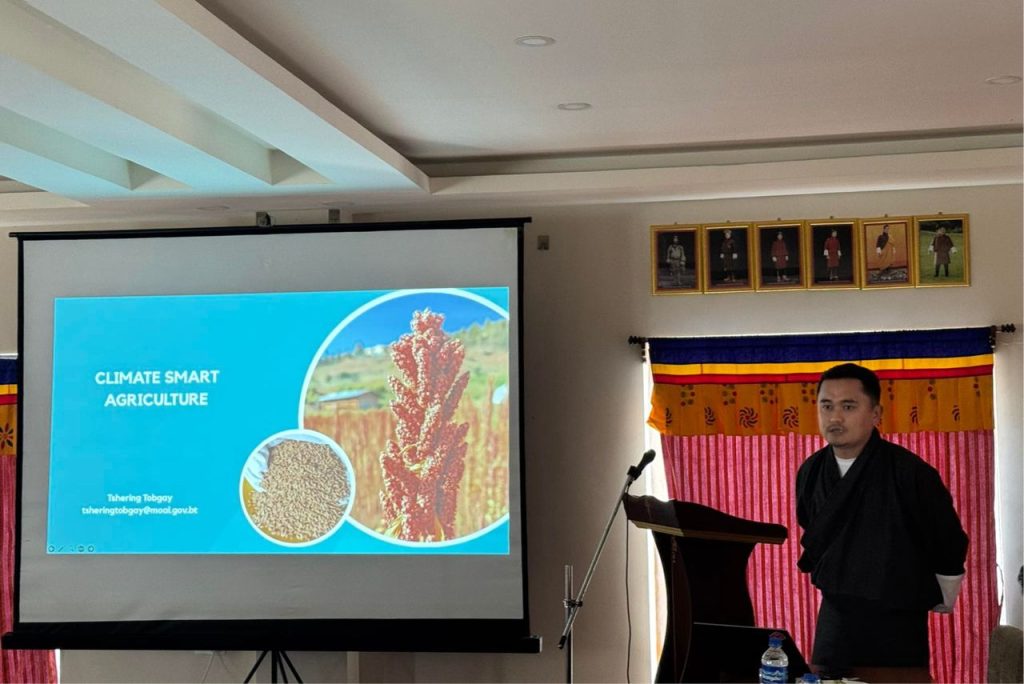
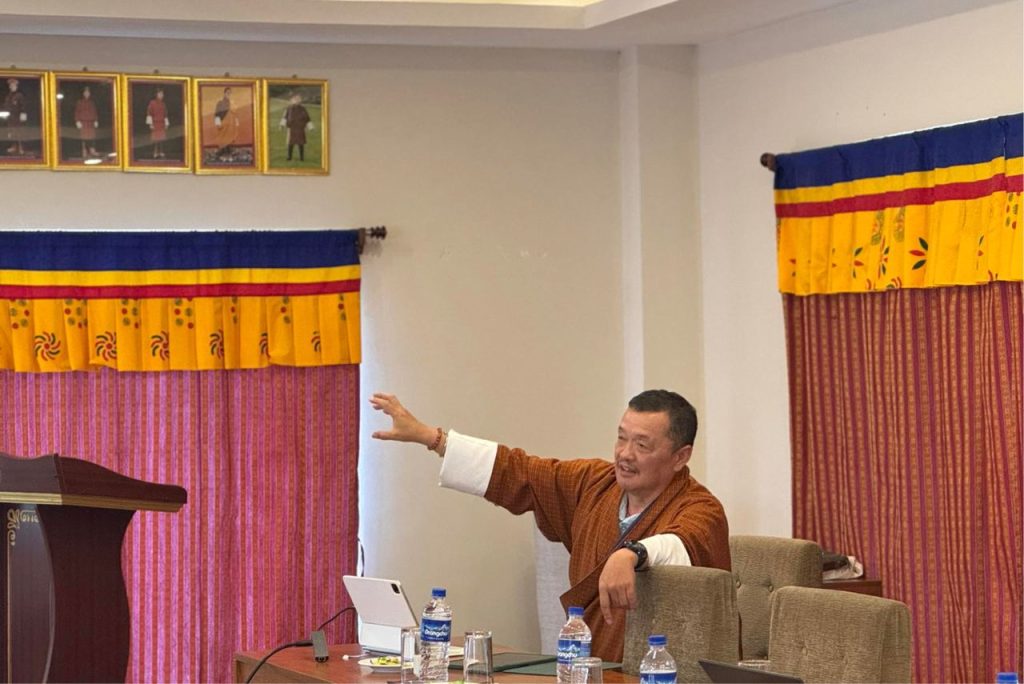
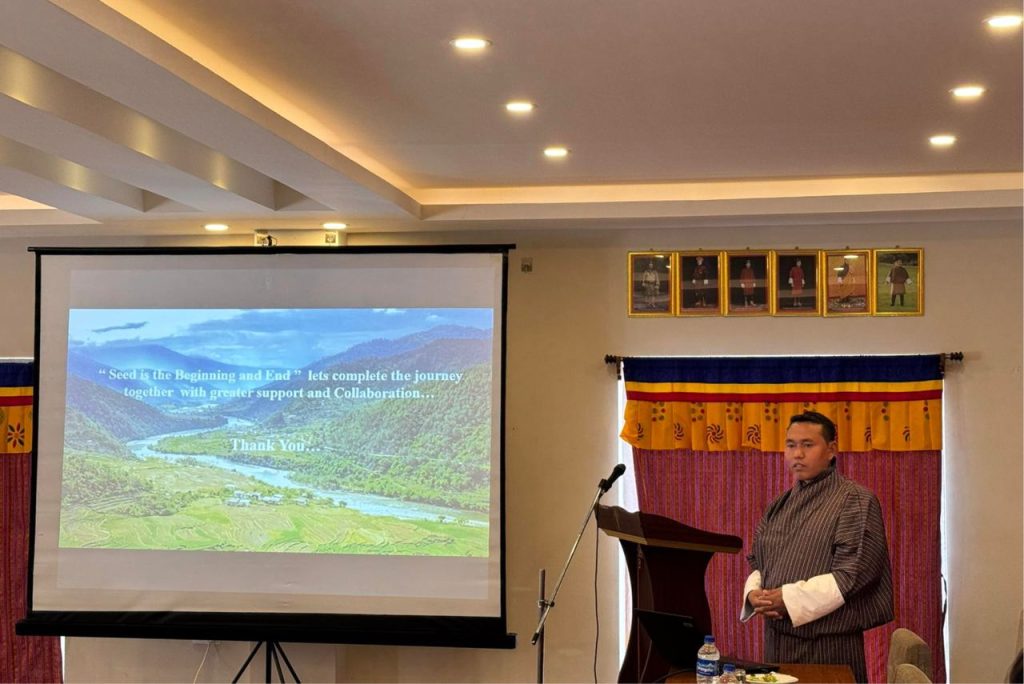
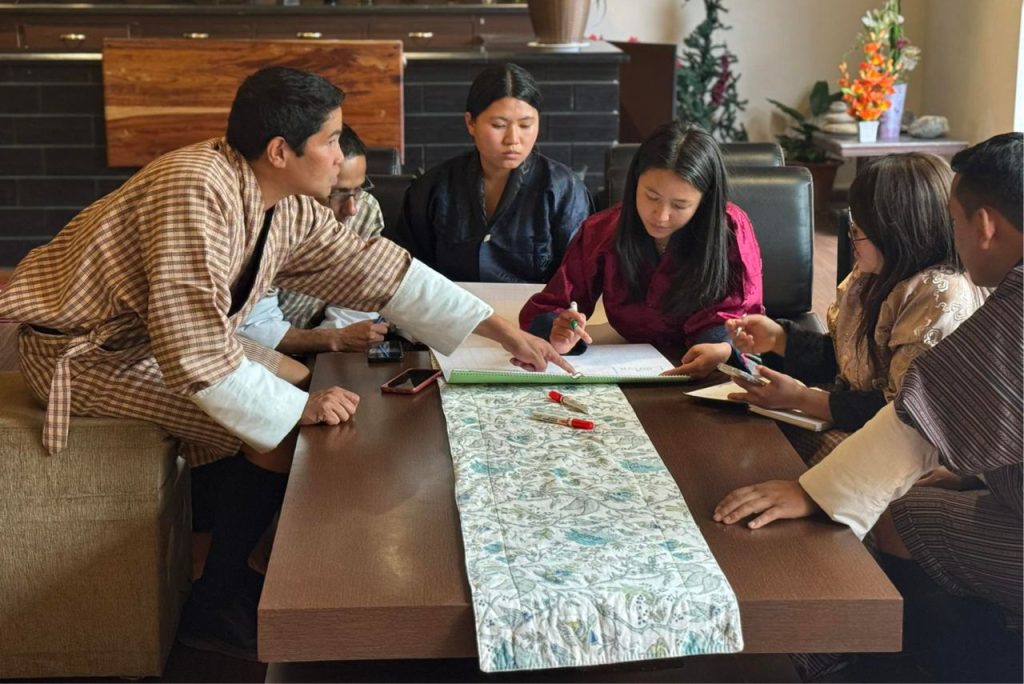
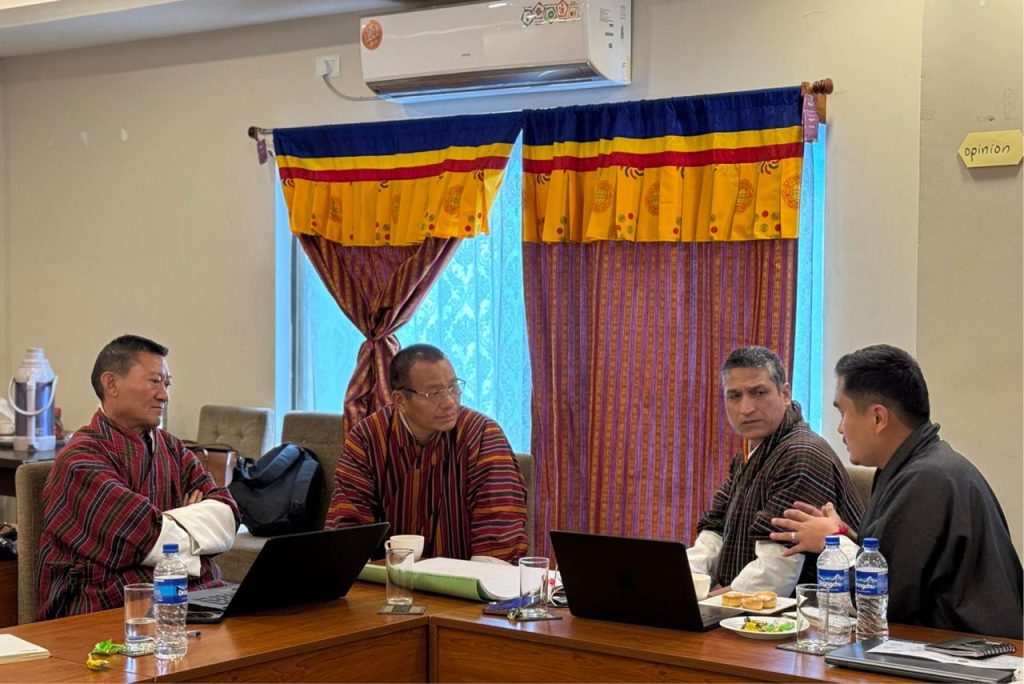
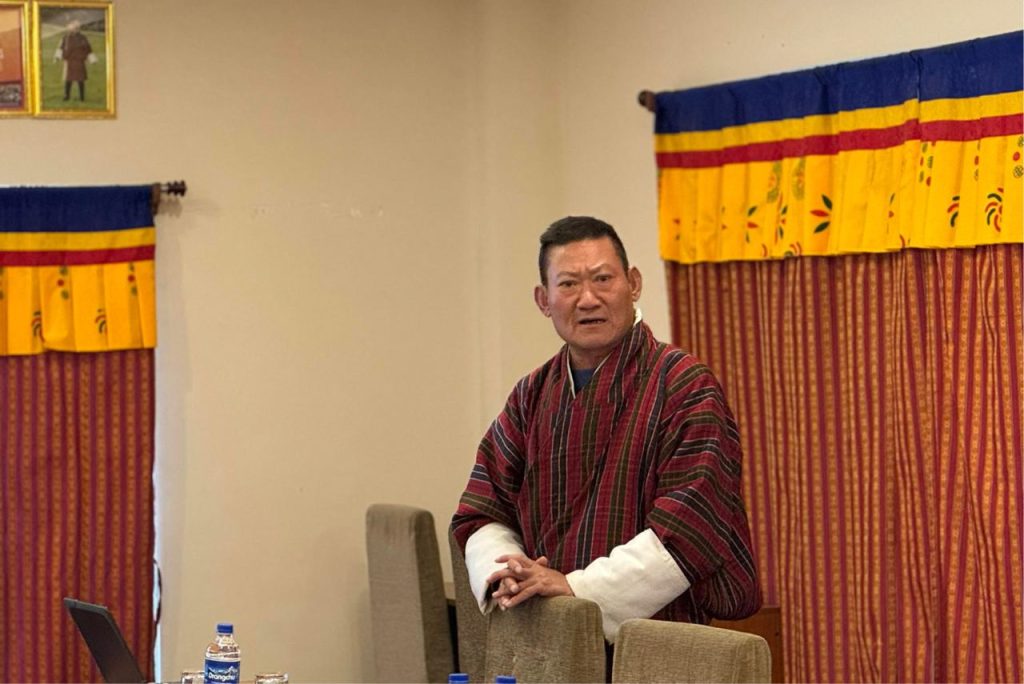
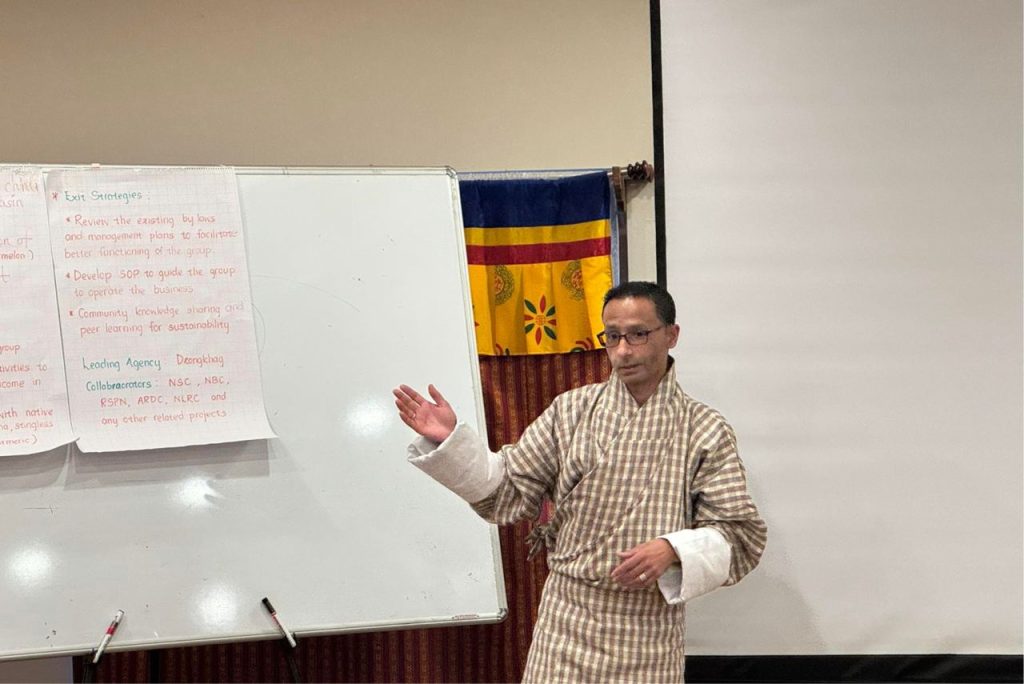
As the harvest season approach, Ap Dorji Rinchen, a resident of Toedwang gewog in Punakha, can finally rest without sacrificing his sleep to guard his six acres of wetland from wild boars and other animals. Earlier,the community had built 11 temporary sheds around the fields for protection,with each household taking turns to monitor the crops overnight.
Now with the introduction and support of electric fencing by the RSPN, the situation has improved significantly. This intervention, which covers six villages has benefited 42 households and protects around 90 acres of farmland. The 17-kilometre stretch of fencing with a total budget of Nu 2.5 million was inaugurated on September 30th,2024.
Prior to the project’s implementation, the local residents were felling trees from the nearby banks of the Phochhu River to use as fencing poles. The resident shared that led to the habitat disturbance of local wildlife including the critically endangered White-bellied Heron (WBH) and highlighted the need for sustainable solutions to protect both the environment and the community’s livelihoods.
Currently, the High-Density Poly-ethylene (HDPE) pipes are used for the electric fence. The HDPE poles not only reduce the impact on local forests but also enhance the durability and effectiveness of the fencing system.
Last year, the WBH juvenile was spotted in Samdingkha area which shows that with the restoration and habitat improvement intervention, the WBH comes back to its natural habitat.
This activity is a part of IKI Project “Developing Ecosystem-based Solutions for Managing Biodiversity landscapes in Bhutan” funded by the Federal Ministry for the Environment, Nature Conservation, Nuclear Safety and Consumer Protection (BMUV), Germany through International Climate Initiative (IKI) with co-funding from MAVA Foundation, Switzerland and the Royal Society for Protection of Nature (RSPN).
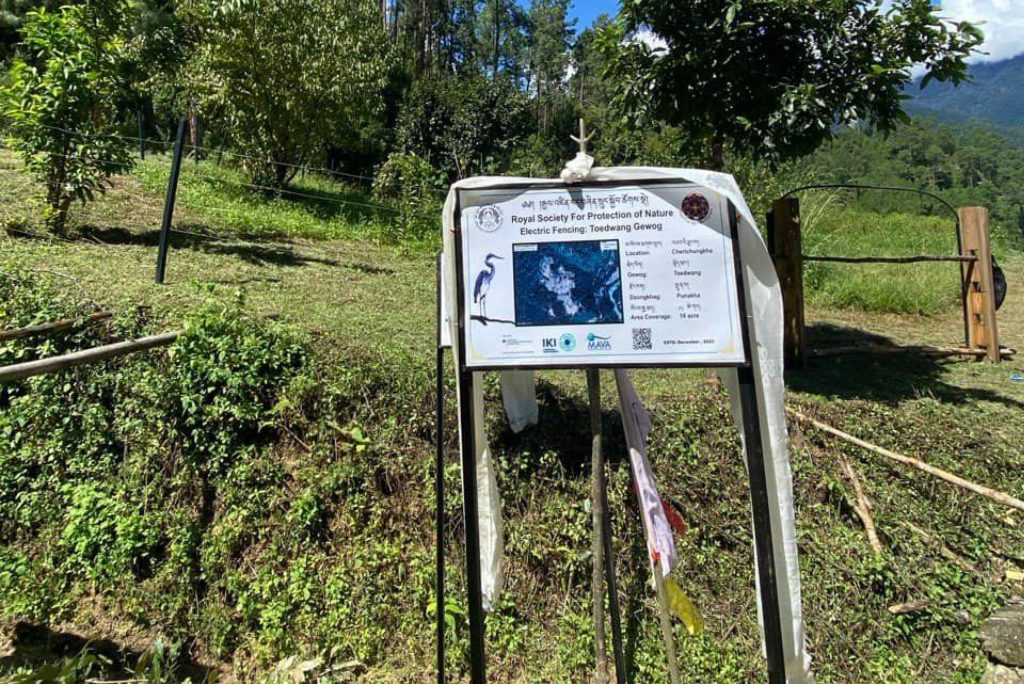
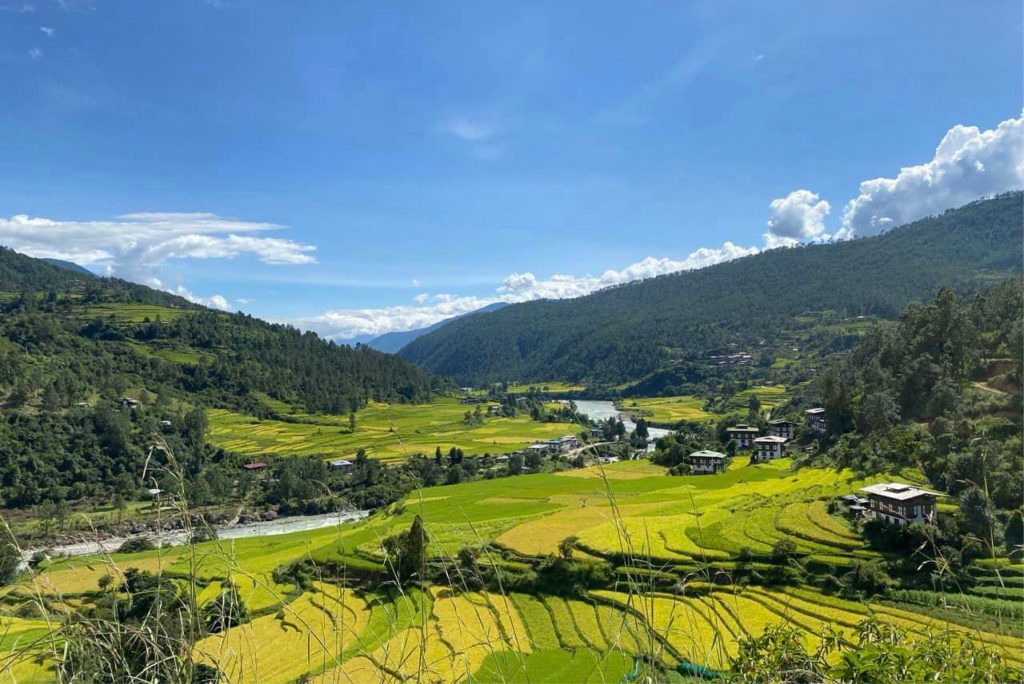
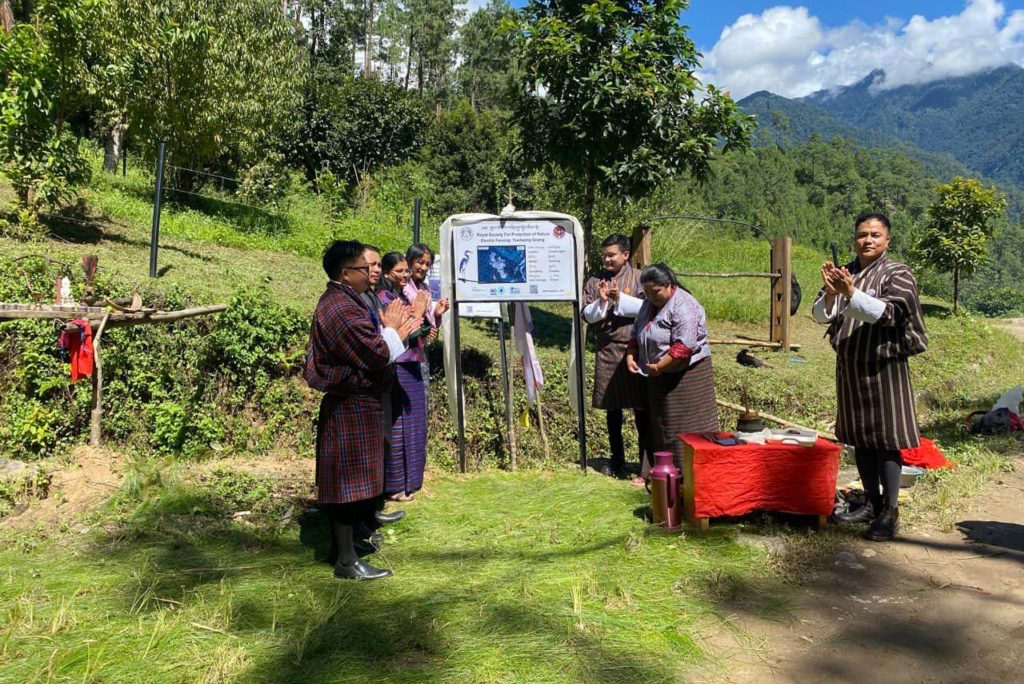
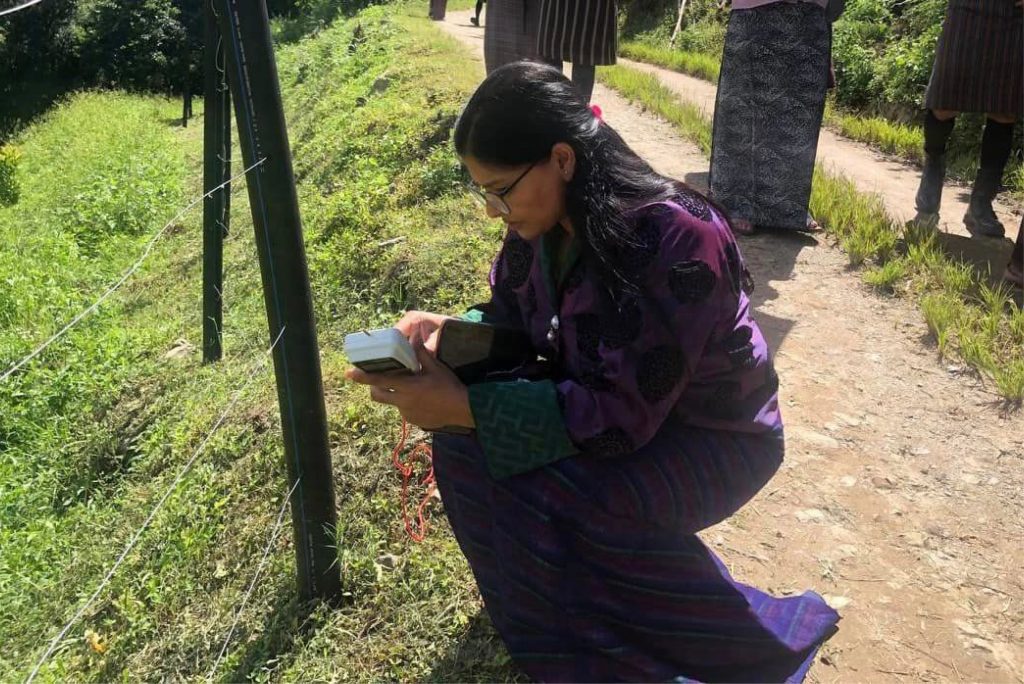
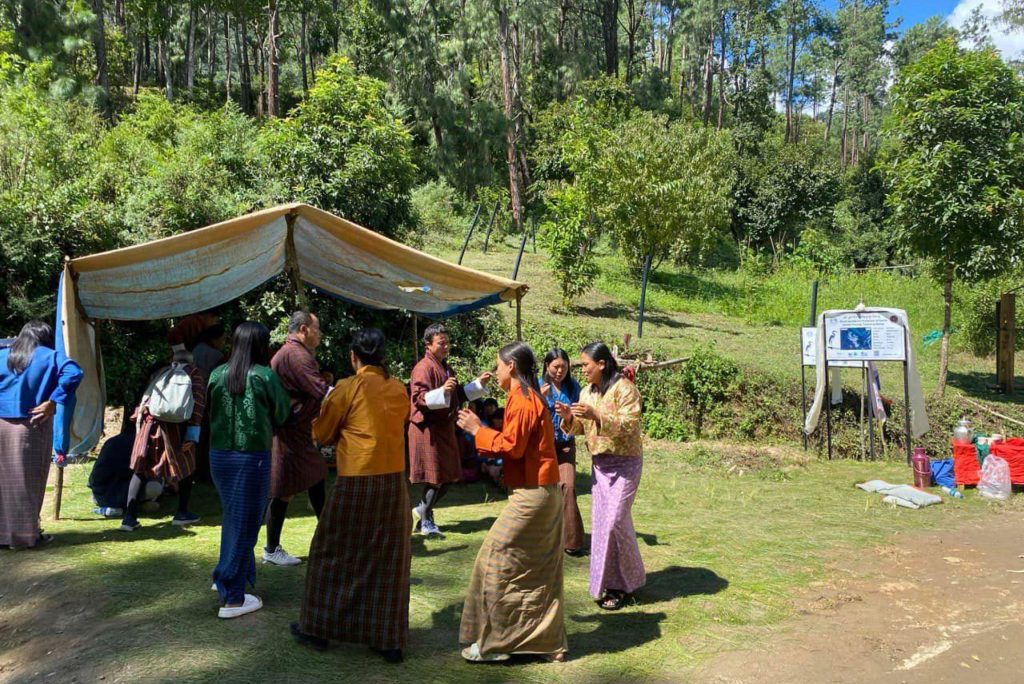
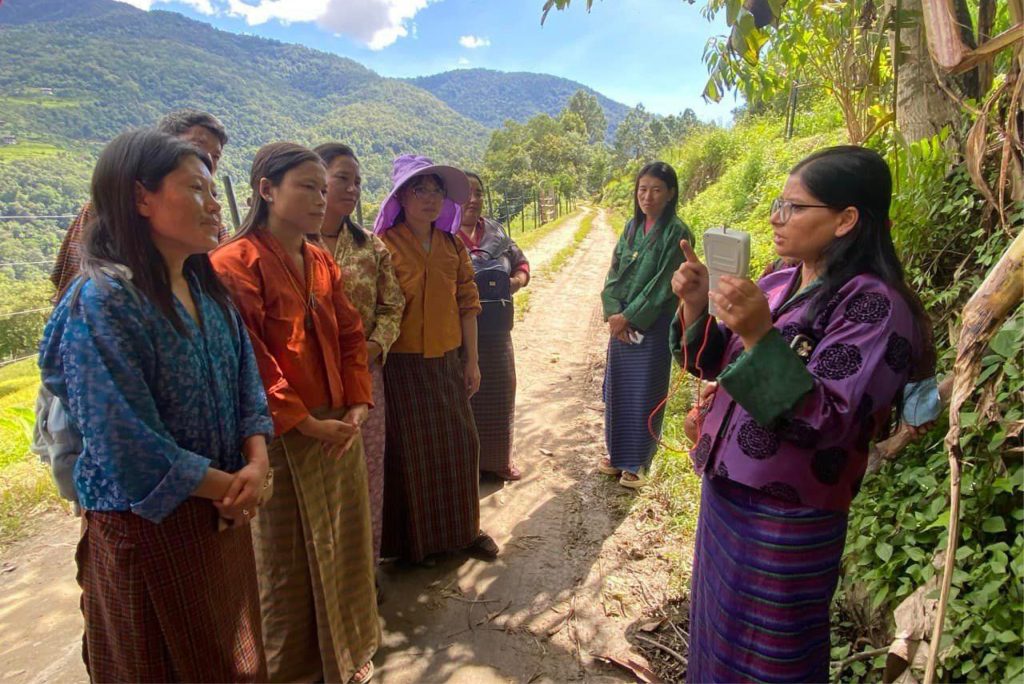
A comprehensive five-day packaging workshop was conducted for the representatives of Climate-smart Agriculture Youth and Women groups of the three project sites (Punakha, Trongsa, and Zhemgang districts) to raise awareness about diverse marketing avenues available at both national and international platforms for their community’s local products.
The training had the following objectives:
1.Enhancing the capacity of local communities, specifically youth and women groups, in packaging and marketing their local products.
2.Equipping local producers with essential skills in hygiene, standards, design, labeling, branding, packaging, and marketing for their local products.
3.Fostering self-sufficiency and generate income opportunities within the community.
During the training, the participants were provided the opportunity to explore available resources and facilities that could elevate the value of their existing local products. The workshop was conducted with the technical support from Cottage & Small Industry (CSI), Department of Industry and coordinated by RSPN as part of the ongoing BMUVI-IKI project.
This project is funded by the Federal Ministry for the Environment, Nature Conservation, Nuclear Safety and Consumer Protection (BMUV), Germany through International Climate Initiative (IKI) with co-funding from MAVA Foundation, Switzerland and the Royal Society for Protection of Nature (RSPN).




Coinciding with the auspicious Birth Anniversary of our beloved Gyalsey, Jigme Namgyel Wangchuck, RSPN team and Extension Agriculture officers distributed hybrid seeds and seedlings to 135 households under Nimshong chiwog, Trongsa and Norbuling chiwog, Dagana districts.
This seed and seedling activity is a part of the Climate Smart Agriculture initiative to improve livelihood opportunities of the local communities living in the White-bellied Heron Landscape.
In the following months, other districts, Punakha, Wangdue Phodrang and Tsirang, within the White-bellied Heron landscape will receive similar support.
This project is funded by the Federal Ministry for the Environment, Nature Conservation, Nuclear Safety and Consumer Protection (BMUV), Germany through International Climate Initiative (IKI) with co-funding from MAVA Foundation, Switzerland and the Royal Society for Protection of Nature (RSPN).
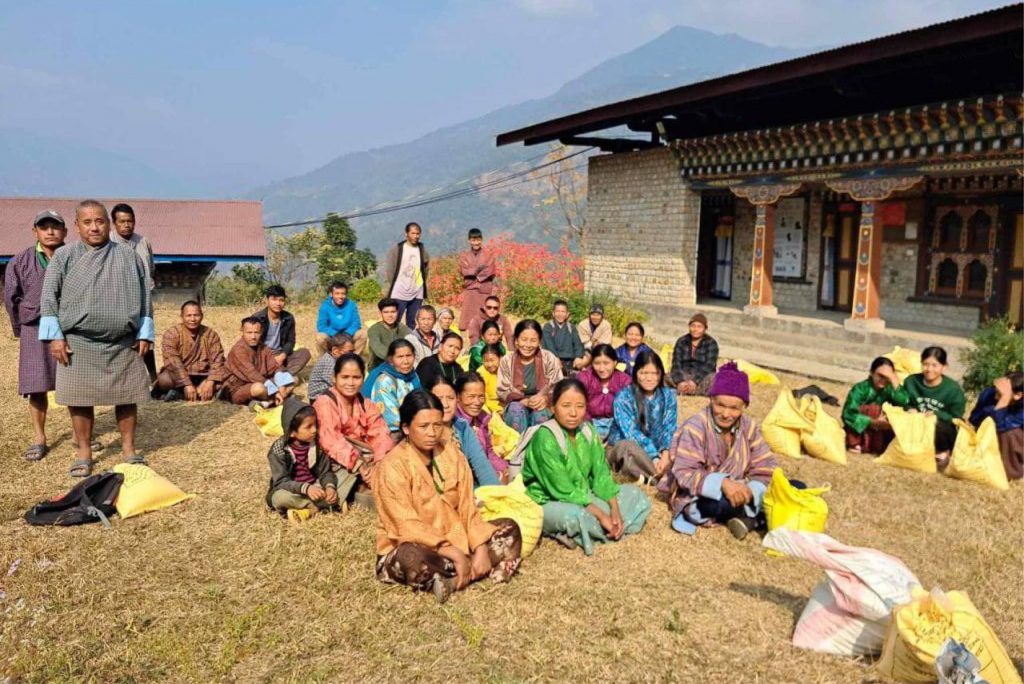
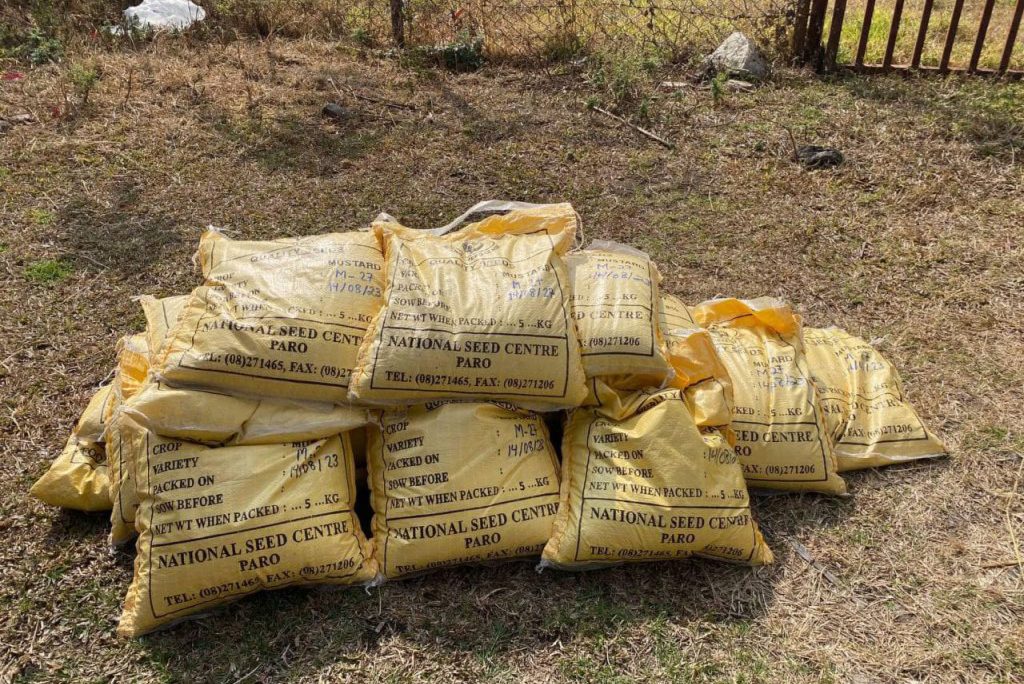
Agriculture plays a crucial role in economic development and has been the backbone of civilizations throughout history, providing sustenance and livelihoods to communities worldwide.
Post-harvest practice is key in keeping the harvested produce’s quality. Poor post-harvest practices and storage could lead to damage to yield, resulting in a huge loss. The post-harvest practice is the transformation of agricultural products into food, or from one form of food into other forms.
To instill post harvest techniques within the communities and also built capacity of the community members living in the White-bellied Heron Landscape, a two-day training on Post-harvest techniques, Pests and Disease management and food processing was provided. The training was attended by 44 (male 11 & 33 female) community members from Nimshong Toe and Moe chiwogs under Korphu gewog, Trongsa district.
It is funded by the Federal Ministry for the Environment, Nature Conservation, Nuclear Safety and Consumer Protection (BMUV), Germany through International Climate Initiative (IKI) with co-funding from MAVA Foundation, Switzerland and the Royal Society for Protection of Nature (RSPN).
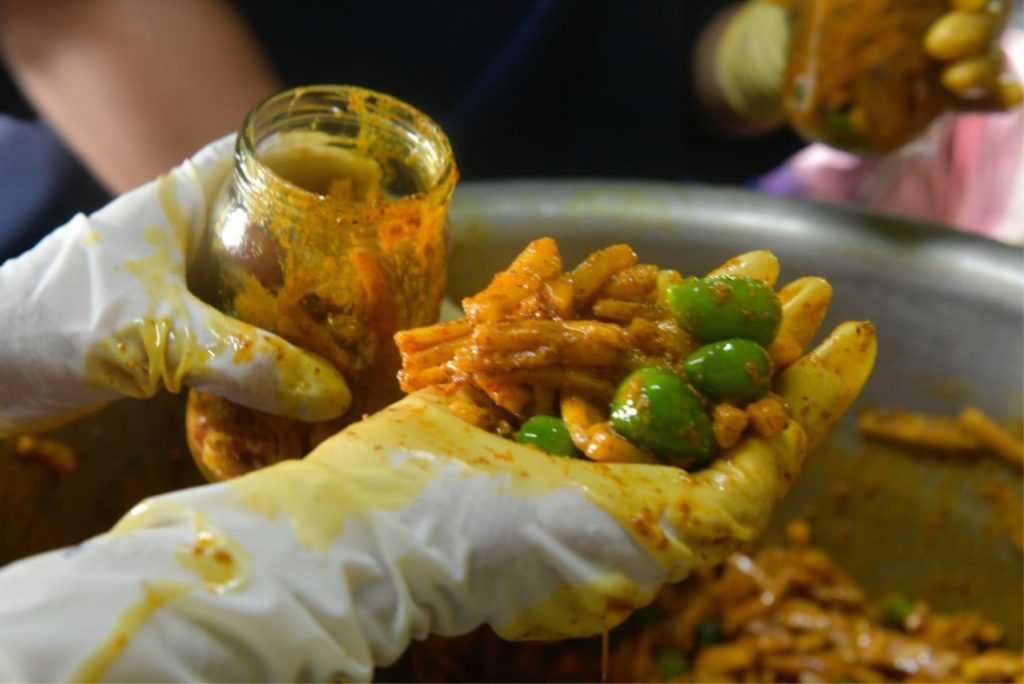
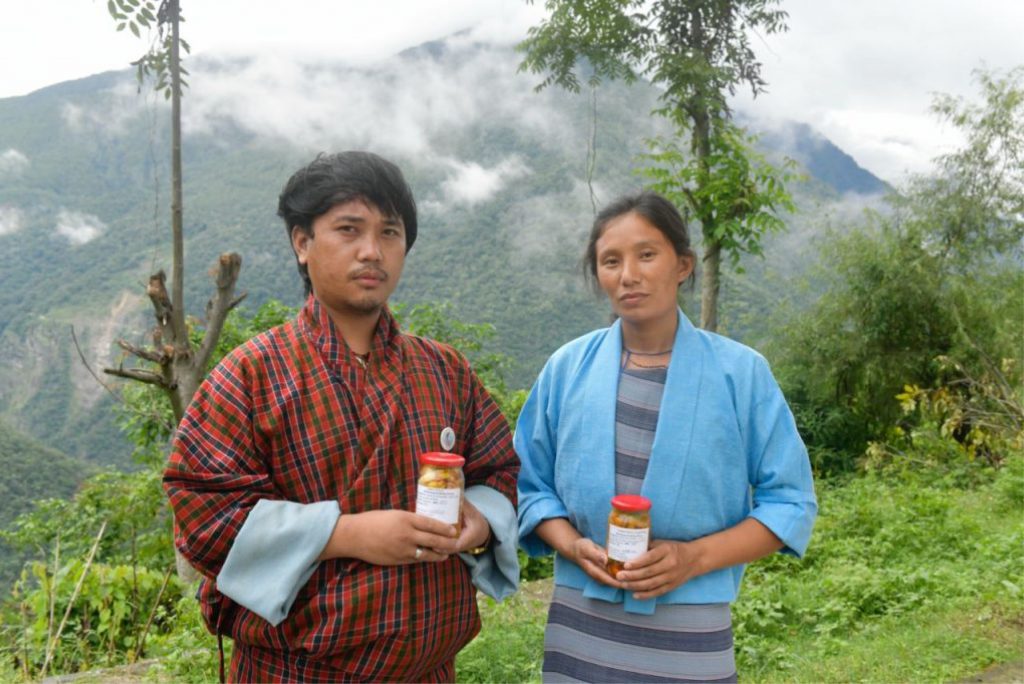
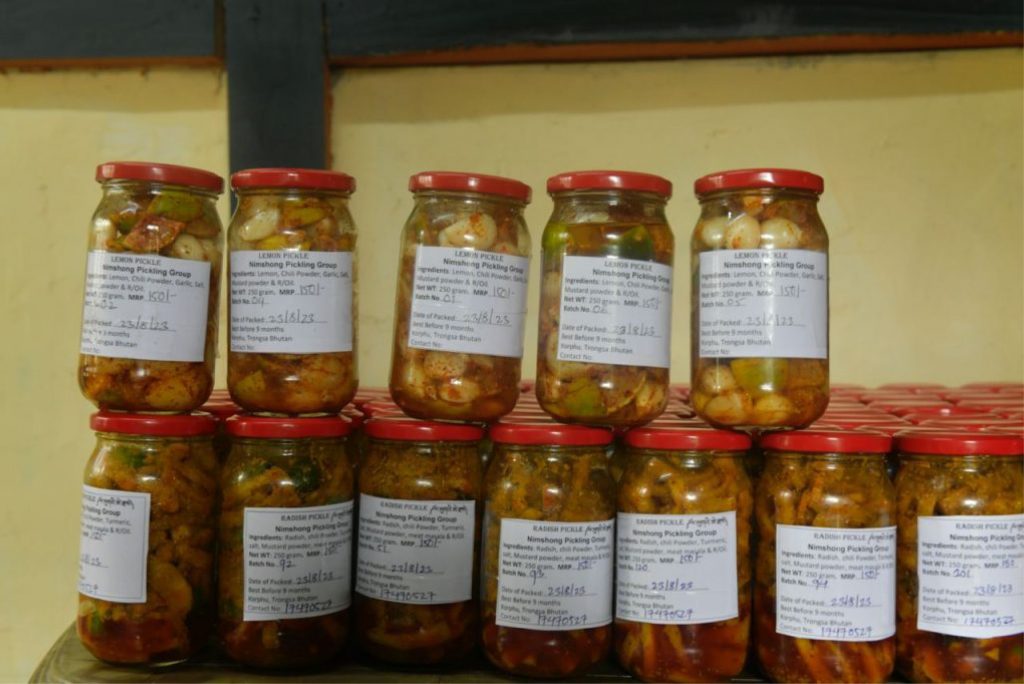
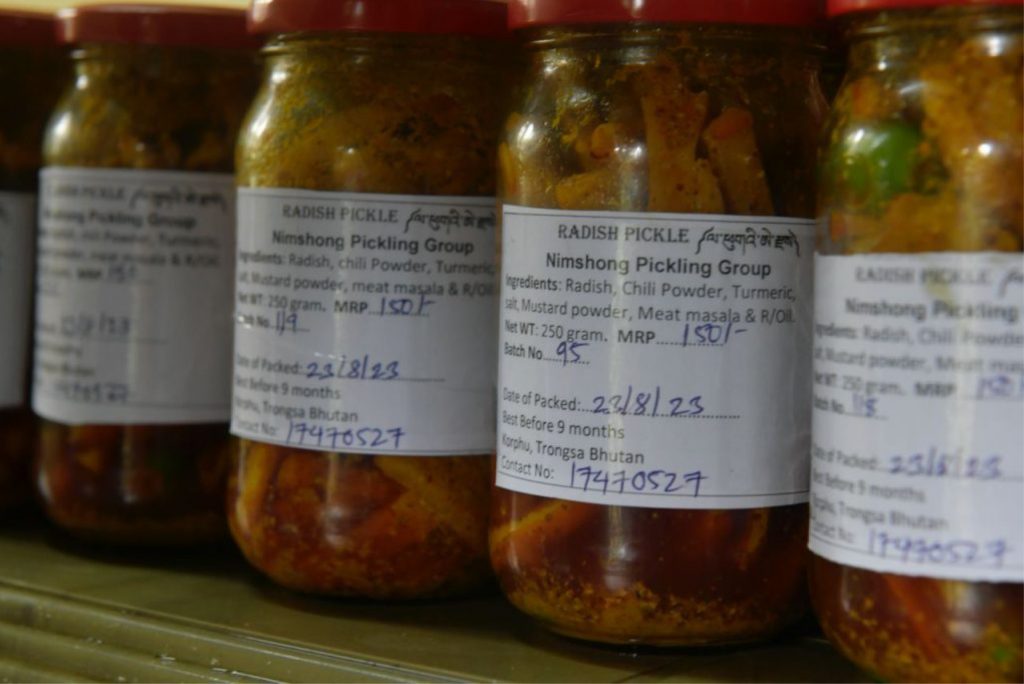
Human-wildlife Conflict(HWC) can occur in various forms, such as crop depredation by angulates, predation on livestock by carnivores, and direct threats to human safety by wildlife. It has become paramount importance in managing these implications for the benefit of both the conservation of wildlife and the well-being of human populations.
When does HWC occur? It arises mainly due to the same or similar need and behaviors of wildlife and the interests and activities of human beings clash. With depletion of natural resources in the wild and increase demands of resources for the human needs, the conflict is mounting more and more than ever.
To mitigate the locally-led initiative in managing the HWC, RSPN has conducted two-day training on managing HWC through Crop compensation scheme. The training conducted from 21 – 22 August 2023 was attended by community groups of Berti and Goling chiwog under Zhemgang district and Ngormey-Bayzam chiwog under Trongsa district. These communities fall under White-bellied Heron landscape.
It is funded by the Federal Ministry for the Environment, Nature Conservation, Nuclear Safety and Consumer Protection (BMUV), Germany through International Climate Initiative (IKI) with co-funding from MAVA Foundation, Switzerland and the Royal Society for Protection of Nature (RSPN).
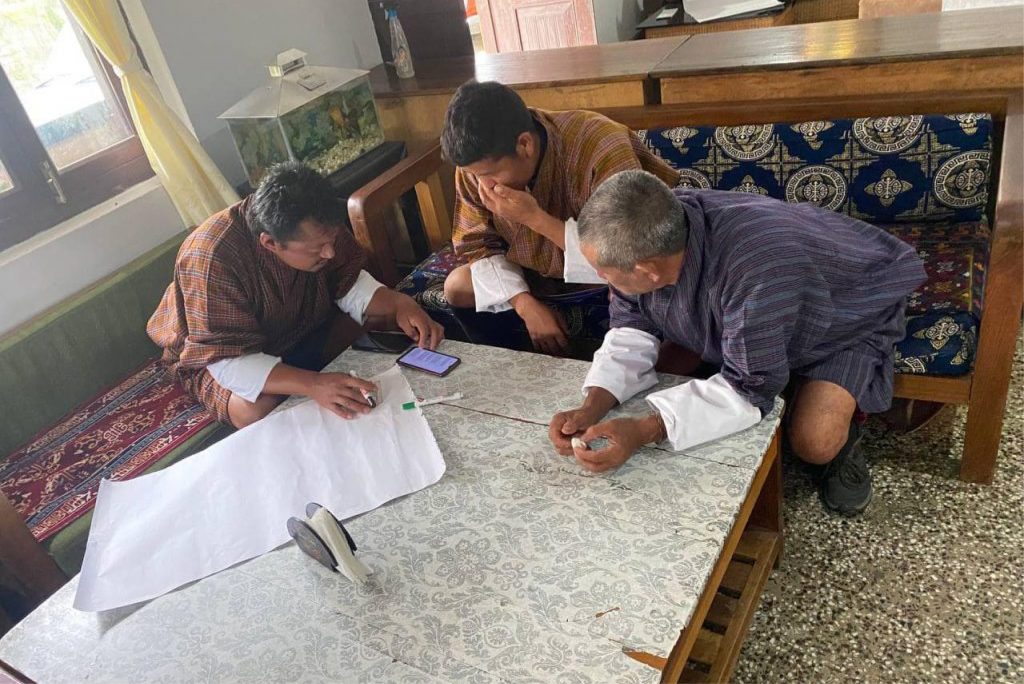
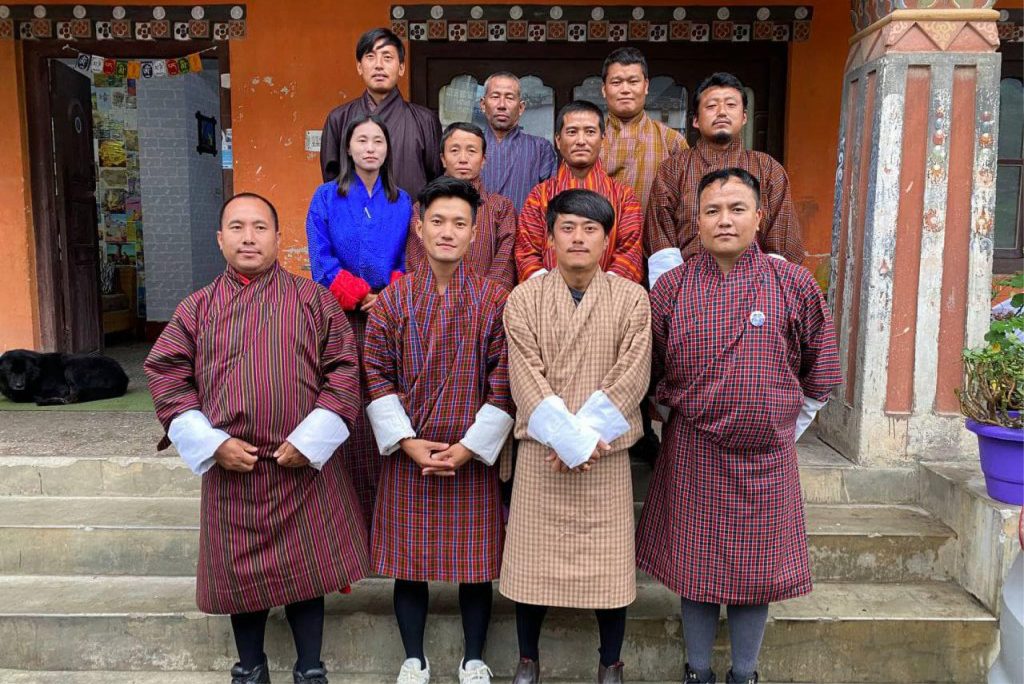
The communities of Langdurbi and Phulabi chiwogs under Zhemgang district are now aware of the marketing linkage components after the successful completion of recently held training.
A four-day market linkage training (February 3-8th,2023) under the #CFLIproject was organized by RSPN in collaboration with gewog extension officers under the Zhemgang district administration.
Through this training, following outcomes were achieved:
1. Established market mechanisms for agricultural products
2. Held Education on cooperative function and regulations
3. Adoption of the management guideline/ by-laws and marketing plan
“𝙈𝙮 𝙫𝙞𝙡𝙡𝙖𝙜𝙚 𝙞𝙨 𝙧𝙪𝙧𝙖𝙡𝙡𝙮 𝙡𝙤𝙘𝙖𝙩𝙚𝙙 𝙖𝙣𝙙 𝙝𝙖𝙫𝙞𝙣𝙜 𝙖𝙘𝙘𝙚𝙨𝙨 𝙩𝙤 𝙨𝙪𝙘𝙝 𝙩𝙧𝙖𝙞𝙣𝙞𝙣𝙜 𝙤𝙥𝙥𝙤𝙧𝙩𝙪𝙣𝙞𝙩𝙞𝙚𝙨 𝙬𝙖𝙨 𝙡𝙞𝙢𝙞𝙩𝙚𝙙. 𝙃𝙤𝙬𝙚𝙫𝙚𝙧, 𝙩𝙝𝙧𝙤𝙪𝙜𝙝 𝙩𝙝𝙞𝙨 𝙢𝙖𝙧𝙠𝙚𝙩 𝙡𝙞𝙣𝙠𝙖𝙜𝙚 𝙩𝙧𝙖𝙞𝙣𝙞𝙣𝙜, 𝙄 𝙖𝙢 𝙣𝙤𝙬 𝙖𝙬𝙖𝙧𝙚 𝙤𝙛 𝙢𝙖𝙧𝙠𝙚𝙩𝙞𝙣𝙜 𝙤𝙥𝙥𝙤𝙧𝙩𝙪𝙣𝙞𝙩𝙞𝙚𝙨 𝙄 𝙘𝙖𝙣 𝙜𝙧𝙖𝙨𝙥 𝙖𝙩 𝙡𝙤𝙘𝙖𝙡 𝙖𝙣𝙙 𝙣𝙖𝙩𝙞𝙤𝙣𝙖𝙡 𝙡𝙚𝙫𝙚𝙡𝙨. 𝙈𝙤𝙧𝙚𝙤𝙫𝙚𝙧, 𝙤𝙣 𝙗𝙚𝙝𝙖𝙡𝙛 𝙤𝙛 𝙒𝙤𝙢𝙚𝙣 𝙎𝙚𝙡𝙛-𝙃𝙚𝙡𝙥 𝙂𝙧𝙤𝙪𝙥𝙨, 𝙄 𝙬𝙤𝙪𝙡𝙙 𝙩𝙤 𝙚𝙭𝙩𝙚𝙣𝙙 𝙤𝙪𝙧 𝙜𝙧𝙖𝙩𝙞𝙩𝙪𝙙𝙚 𝙩𝙤 𝙍𝙎𝙋𝙉 𝙖𝙣𝙙 𝘾𝙁𝙇𝙄 𝙥𝙧𝙤𝙟𝙚𝙘𝙩 𝙛𝙤𝙧 𝙨𝙪𝙥𝙥𝙤𝙧𝙩𝙞𝙣𝙜 𝙩𝙝𝙚 𝙜𝙧𝙤𝙪𝙥𝙨 𝙬𝙞𝙩𝙝 𝙥𝙖𝙘𝙠𝙖𝙜𝙞𝙣𝙜 𝙚𝙦𝙪𝙞𝙥𝙢𝙚𝙣𝙩. “- 𝙈𝙧𝙨. 𝙇𝙚𝙠𝙞 𝘿𝙚𝙢𝙖, 𝙋𝙝𝙪𝙡𝙖𝙗𝙞 𝙏𝙨𝙝𝙤𝙣𝙜𝙥𝙖
The training was able to reach out to 82 participants (47 female and 35 male) from the two chiwogs.
RSPN would like to thank the Election Commission of Bhutan, Zhemgang Dzongkhag administration, and Bardo gewog for your continued support and cooperation.
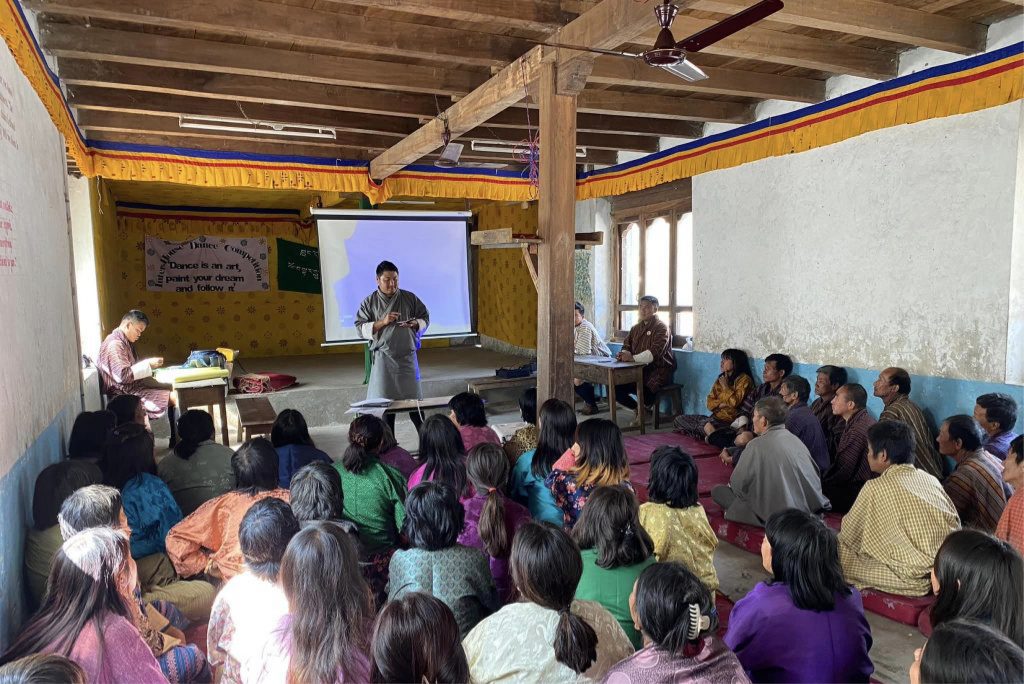
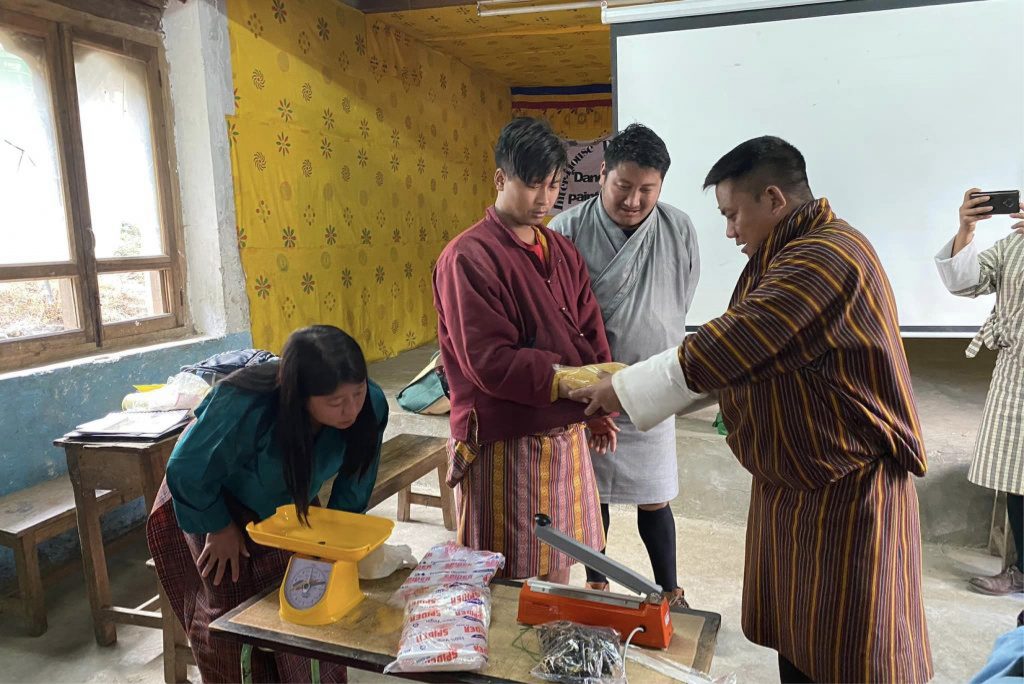
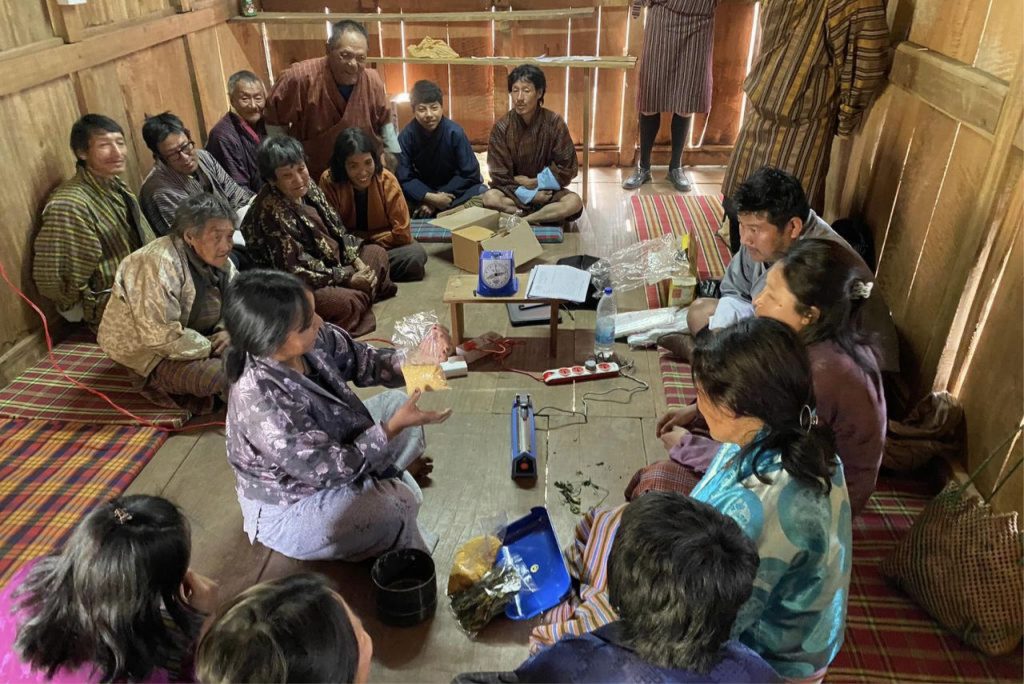
A youth–led winter chilli farming group working in Samarchhu village under Tsendagang Gewong in Dagana Dzongkhag, is turning into a model for many aspiring youth farmers.
With RSPN’s support through the mass distribution of chilli seedlings to the farmers of Samarchhu Chiwog under Tsendagang Gewog in Dagana, the farmers have started venturing into growing mass winter chillies. One such inspiring and promising initiative is the youth-led mass chilli production on a commercial scale.
Bimal Subba, a youth in his early twenties decided to stay in the village after completing class ten and has initially worked on his father’s fallow lands, clearing off 1.5 acres of land to start the mass chilli cultivation. A youth group established early this year has three youth members keenly taking up the chilli business.
The group has already begun cultivating chilies and earned over Nu. 55000 from their first harvest. Currently, the youth grew chilies on 5 acres of leased land. The youth group has also planned to upscale their chilli production and venture into growing other varieties of vegetables on the additional 5 acres of the leased land.
And the story is no different for other farmers in the Chiwog. In the past, the farmers grow chilli for self-consumption only but the situation is different this year. Growing Chilli has become a lucrative business now as the area has huge potential for chilli production. Locals in Samarchhu say earlier they used to buy chillies from neighboring Indian towns. It is around two hours drive from Samarchhu to reach some of the neighboring Indian towns.
The Samarchhu Chiwog is identified as one of the most potential areas for chili cultivation and RSPN shall render continued support and encourage the communities and the youth group to take forward the initiatives. Besides, the communities have also shown interest to take up other alternative livelihood programs such as fishery, poultry, piggery, and ecotourism and RSPN will continue to support these initiatives to help in building community and landscape resilience to the impacts of climate change.
Funded by the Federal Ministry for Environment, Nature Conservation and Nuclear Safety (BMU) Germany through International Climate Initiative (IKI), the activity is part of RSPN’s ongoing project “Developing Ecosystem-based Solutions for Managing Biodiversity Landscapes in Bhutan with its objective to establish approaches and tools for protecting and managing the Critically Endangered White-bellied Heron.
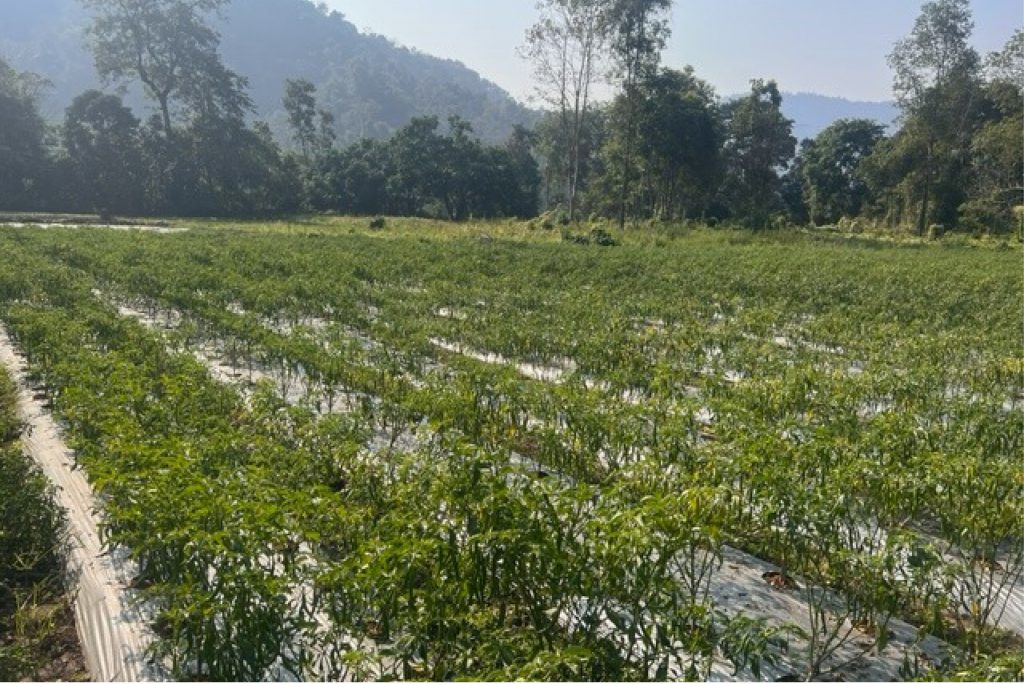
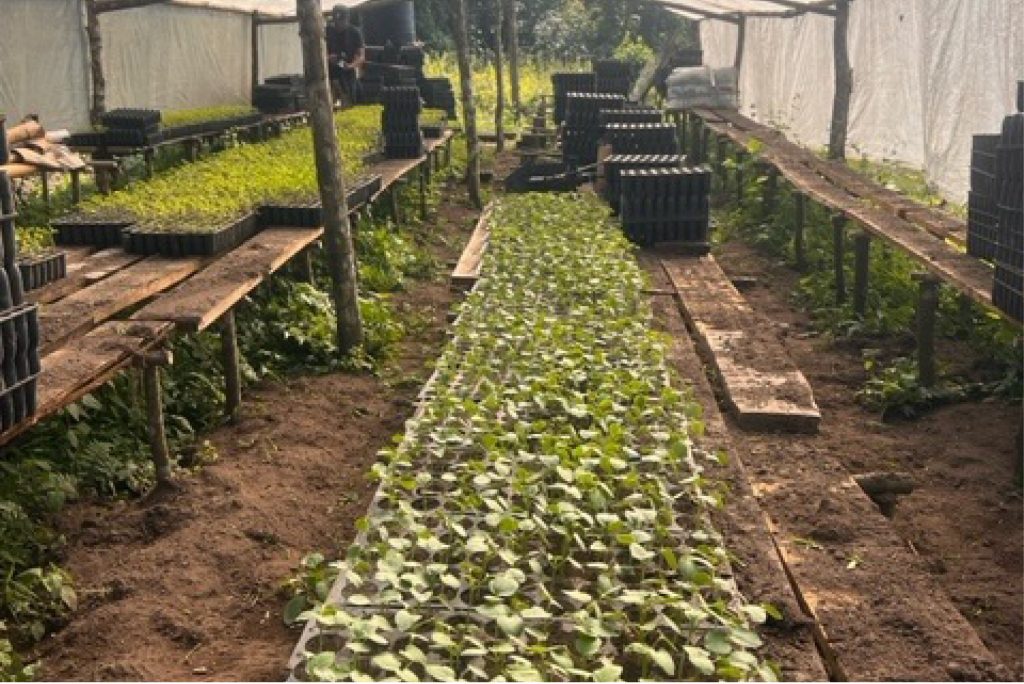
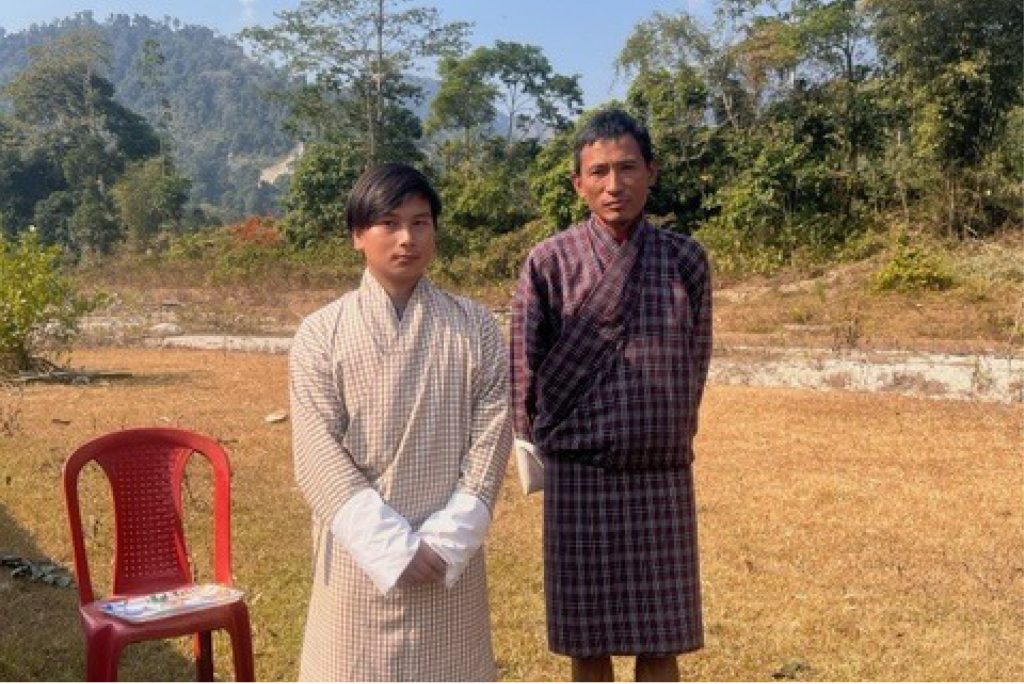
Copyright © 2025 RSPN All Rights Reserved